- Privacy Policy

Home » 300+ Controversial Research Topics

300+ Controversial Research Topics

Controversial research topics are a vital aspect of scientific inquiry, as they often challenge existing assumptions and generate debates among experts in the field. These topics can range from ethical dilemmas to scientific controversies that challenge traditional thinking, and can spark heated discussions and disagreements. However, it is through exploring and investigating these controversial topics that researchers can uncover new insights, theories , and methodologies that ultimately drive progress and innovation in their respective fields. While controversial research topics can be complex and contentious, they also offer opportunities for growth and learning as scientists work to uncover the truth and push the boundaries of what is currently known.
Controversial Research Topics
Controversial Research Topics are as follows:
- The impact of genetically modified organisms on human health.
- The use of embryonic stem cells for medical research.
- The effectiveness of abstinence-only sex education.
- The effects of violent video games on children and adolescents.
- The link between intelligence and race.
- The legalization of marijuana.
- The use of performance-enhancing drugs in sports.
- The existence of paranormal phenomena.
- The impact of social media on mental health.
- The effects of climate change on the global economy.
- The use of animals in scientific research.
- The impact of immigration on the economy and culture.
- The benefits and drawbacks of homeschooling.
- The link between vaccines and autism.
- The benefits and risks of gene editing.
- The impact of artificial intelligence on employment.
- The effects of sugar consumption on human health.
- The ethics of human cloning.
- The effects of globalization on the environment.
- The impact of minimum wage laws on employment and the economy.
- The effects of bilingual education on academic achievement.
- The relationship between gun control and crime rates.
- The effects of spanking on child development.
- The impact of media bias on public opinion.
- The relationship between poverty and crime.
- The effects of same-sex marriage on society.
- The impact of nuclear power on the environment.
- The effects of air pollution on human health.
- The impact of the pharmaceutical industry on healthcare.
- The impact of artificial sweeteners on human health.
- The effects of divorce on children.
- The impact of music on behavior and emotions.
- The effects of solitary confinement on prisoners.
- The impact of mandatory minimum sentences on the criminal justice system.
- The effects of standardized testing on education.
- The impact of affirmative action on employment and education.
- The effects of social media on political polarization.
- The effects of immigration policies on families and communities.
- The impact of diet on mental health.
- The ethics of animal testing.
- The impact of technology on human relationships.
- The impact of the gig economy on workers’ rights.
- The effects of corporal punishment in schools.
- The impact of income inequality on society.
- The effects of video game addiction on mental health.
- The effects of police brutality on society.
- The impact of the gig economy on the economy as a whole.
- The effects of alternative medicine on human health.
- The impact of military spending on the economy.
- The effects of censorship on free speech.
- The safety and effectiveness of vaccines.
- The existence of extraterrestrial life.
- The impact of climate change on national security.
- The use of genetically modified organisms in food production.
- The impact of social media on political elections.
- The ethics of artificial intelligence.
- The impact of immigration on national security.
- The effectiveness of gun control laws.
- The ethics of animal rights.
- The impact of video game violence on real-world violence.
- The impact of cell phone radiation on human health.
- The impact of the opioid epidemic on society.
- The effectiveness of alternative medicine.
- The ethics of physician-assisted suicide.
- The impact of globalization on human rights.
- The impact of the gig economy on labor rights.
- The impact of income inequality on social mobility.
- The ethics of gene editing in humans.
- The impact of trade agreements on the economy.
- The ethics of cloning.
- The impact of solitary confinement on mental health.
- The effectiveness of mandatory minimum sentencing laws.
- The ethics of animal agriculture.
- The impact of poverty on mental health.
- The effectiveness of sex education in schools.
- The impact of cultural appropriation on society.
- The ethics of using animals in entertainment.
- The impact of air pollution on human health.
- The impact of artificial intelligence on privacy.
- The ethics of using drones in warfare.
- The effectiveness of rehabilitation programs in prisons.
- The impact of genetically modified crops on the environment.
- The ethics of surrogacy.
- The impact of the gig economy on social welfare programs.
- The impact of social media on interpersonal relationships.
- The ethics of euthanasia.
- The impact of the Internet on society.
- The effectiveness of affirmative action policies.
- The impact of social media on youth development.
- The impact of renewable energy on the economy.
- The impact of cyberbullying on mental health.
- The ethics of human-animal hybrids.
- The impact of overpopulation on the environment.
- The impact of social media on political polarization.
- The impact of social media on mental health and well-being.
- The effects of violent video games on aggressive behavior in children and adolescents.
- The effects of homeschooling on academic achievement and social development.
- The ethics of human cloning for reproductive purposes.
- The impact of religious fundamentalism on political extremism and violence.
- The effects of poverty on child development and educational outcomes.
- The ethics of physician-assisted suicide for terminally ill patients.
- The impact of social media on political polarization and democracy.
- The effects of bilingual education on language proficiency and academic success.
- The ethics of genetically modifying human embryos for non-medical purposes.
- The impact of affirmative action on college admissions and diversity.
- The effects of mindfulness meditation on mental health and well-being.
- The ethics of animal rights and the use of animals for human consumption.
- The impact of the gig economy on worker rights and job security.
- The effects of minimum wage policies on employment and poverty reduction.
- The ethics of using human embryos for stem cell research.
- The impact of economic globalization on income inequality and economic growth.
- The effects of mandatory drug testing in the workplace on employee privacy and productivity.
- The ethics of organ donation and the sale of organs for transplantation.
- The impact of social class on educational opportunities and academic achievement.
- The effects of video game violence on aggressive behavior in youth.
- The ethics of artificial intelligence and autonomous decision-making.
- The impact of gun culture on gun violence and public safety.
- The effects of parental involvement in education on academic achievement.
- The ethics of animal euthanasia and animal rights.
- The impact of prison privatization on criminal justice and rehabilitation.
- The effects of solitary confinement on mental health and prisoner rights.
- The ethics of using performance-enhancing drugs in sports.
- The impact of globalization on cultural identity and cultural preservation.
- The effects of medical marijuana on pain management and addiction.
- The ethics of using animals for animal testing and experimentation.
- The impact of media bias on public opinion and political polarization.
- The effects of youth sports specialization on athletic performance and injury rates.
- The ethics of using drones for military and civilian purposes.
- The impact of the obesity epidemic on healthcare costs and public health.
- The effects of gender stereotypes on career choices and gender equality.
- The ethics of surrogacy and the commercialization of reproduction.
- The impact of social media on body image and self-esteem.
- The effects of cyberbullying on mental health and social relationships.
- The ethics of animal euthanasia and humane animal control.
- The impact of artificial intelligence on job displacement and retraining.
- The effects of mandatory school uniforms on student behavior and academic performance.
- The ethics of using genetically modified crops for food production.
- The impact of immigration on cultural assimilation and diversity.
- The effects of peer pressure on adolescent behavior and decision-making.
- The ethics of using animals for zoos and aquariums.
- The impact of natural disasters on social inequality and disaster response.
- The effects of childhood trauma on adult mental health and well-being.
- The ethics of using gene editing to create “designer babies”.
- The impact of gentrification on urban communities and displacement.
- The effects of income inequality on political representation and corruption.
- The ethics of using animals for entertainment, such as in theme parks and circuses.
- The effects of pornography on sexual behavior and attitudes towards women.
- The ethics of gene editing in human embryos for disease prevention.
- The effects of affirmative action on workplace diversity and discrimination.
- The ethics of animal testing for cosmetic purposes.
- The impact of immigration on economic growth and job creation.
- The effects of gun control policies on crime rates and public safety.
- The ethics of euthanasia for patients with severe disabilities.
- The impact of income inequality on social mobility and economic opportunity.
- The effects of online dating on relationships and marriage.
- The ethics of using animals for scientific experimentation.
- The impact of climate change on global migration patterns.
- The effects of standardized testing on student learning and teacher accountability.
- The ethics of using social media data for targeted advertising.
- The impact of artificial intelligence on employment and job displacement.
- The effects of genetically modified organisms on human health and the environment.
- The ethics of surrogacy and the commodification of pregnancy.
- The impact of the #MeToo movement on workplace culture and gender equality.
- The effects of mandatory vaccination policies on public health and individual autonomy.
- The ethics of using embryonic stem cells for medical research.
- The impact of media censorship on freedom of speech and expression.
- The effects of school vouchers on education equity and public education.
- The ethics of animal agriculture and the environmental impact of meat consumption.
- The impact of social media algorithms on political polarization and misinformation.
- The effects of mass incarceration on communities of color and criminal justice reform.
- The ethics of human genetic engineering for athletic performance enhancement.
- The impact of artificial intelligence on privacy and personal data protection.
- The effects of teacher tenure on teacher effectiveness and student achievement.
- The ethics of autonomous weapons systems and the future of warfare.
- The impact of affirmative action on college admissions and meritocracy.
- The effects of social media on youth mental health and addiction.
- The ethics of using human tissue for medical research.
- The impact of hydraulic fracturing on the environment and public health.
- The effects of school discipline policies on student success and racial disparities.
- The ethics of using animal organs for human transplantation.
- The impact of trade policies on international development and economic inequality.
- The effects of workplace surveillance on employee privacy and productivity.
- The ethics of human enhancement technologies and the implications for society.
- The impact of renewable energy on energy independence and national security.
- The effects of immigration policies on family separation and human rights.
- The ethics of using gene editing to enhance intelligence and cognitive abilities.
- The impact of social media on political activism and social movements.
- The effects of mandatory minimum sentences on criminal justice and recidivism rates.
- The ethics of using nanotechnology for medical treatment and enhancement.
- The impact of artificial intelligence on democracy and political participation.
- The effects of parental involvement in education on student achievement.
- The ethics of using animals for entertainment, such as in circuses and aquariums.
- The impact of mass surveillance on civil liberties and government transparency.
- The effects of school segregation on educational opportunities and social mobility.
- The ethics of using human embryonic stem cells for medical research.
- The impact of social media on political polarization and division.
- The effects of affirmative action policies on college admissions.
- The ethics of using animals for food and cosmetic testing.
- The impact of immigration policies on national security.
- The effects of e-cigarettes on lung health and smoking cessation.
- The ethics of cloning animals for commercial purposes.
- The impact of the war on drugs on public health and criminal justice.
- The effects of homeschooling on academic achievement and socialization.
- The impact of income tax policies on economic growth.
- The effects of police body cameras on accountability and transparency.
- The impact of artificial intelligence on human creativity and innovation.
- The effects of globalization on job outsourcing and economic inequality.
- The ethics of animal testing for medical research.
- The impact of mandatory minimum sentences on criminal justice and rehabilitation.
- The ethics of using human stem cells for medical research.
- The impact of social media on body image and eating disorders.
- The effects of the death penalty on crime deterrence and human rights.
- The ethics of using genetically modified crops for commercial agriculture.
- The impact of social media on romantic relationships and dating culture.
- The effects of standardized testing on teacher effectiveness and job satisfaction.
- The ethics of using drones for military strikes and surveillance.
- The impact of minimum wage policies on poverty and unemployment.
- The effects of workplace diversity and inclusion initiatives on productivity and morale.
- The ethics of using animals for entertainment purposes, such as in circuses or zoos.
- The impact of climate change on global economic growth and stability.
- The effects of solitary confinement on mental health and recidivism rates.
- The impact of the gig economy on worker exploitation and income insecurity.
- The effects of medical marijuana on pain management and opioid addiction.
- The ethics of using virtual reality for military training and simulation.
- The impact of school choice policies on education equity and segregation.
- The effects of noise pollution on mental and physical health.
- The ethics of using animal products for clothing and fashion.
- The impact of artificial intelligence on artistic expression and creativity.
- The effects of prison privatization on criminal justice and human rights.
- The ethics of using robots for elder care and healthcare.
- The impact of affirmative action policies on workplace diversity and inclusion.
- The effects of social media on adolescent self-esteem and body image.
- The ethics of using human organs for transplant research.
- The impact of drone strikes on civilian casualties and international law.
- The effects of microplastic pollution on human health and the environment.
- The ethics of animal cloning for livestock production.
- The impact of renewable energy on job creation and economic growth.
- The effects of occupational licensing on job opportunities and consumer protection.
- The ethics of using artificial intelligence in decision-making processes in the criminal justice system.
- The effects of climate change on global migration patterns.
- The ethics of genetically modifying human embryos.
- The impact of the meat industry on the environment and animal welfare.
- The efficacy and safety of alternative medicine treatments.
- The effects of marijuana legalization on crime rates.
- The ethics of using animals for scientific research.
- The effects of childhood trauma on adult mental health.
- The impact of technology on privacy and personal data protection.
- The effects of gun ownership on public safety.
- The ethics of gene editing to enhance physical and cognitive abilities.
- The impact of gentrification on urban communities.
- The effects of long-term space travel on human health.
- The ethics of using human subjects in medical research.
- The impact of income inequality on access to healthcare.
- The effects of the gig economy on workers’ rights and protections.
- The ethics of using non-human animals for food consumption.
- The impact of social media on political discourse and democracy.
- The effects of standardized testing on educational outcomes.
- The ethics of using autonomous weapons in warfare.
- The impact of income tax policies on economic inequality.
- The effects of urbanization on mental health and well-being.
- The ethics of using artificial intelligence for military applications.
- The impact of population growth on the environment and natural resources.
- The effects of screen time on children’s cognitive development.
- The ethics of surrogacy and reproductive technology.
- The impact of mental health stigma on access to care and treatment.
- The ethics of animal captivity and entertainment.
- The impact of the opioid epidemic on public health and safety.
- The effects of universal basic income on economic stability and well-being.
- The ethics of using genetic data for personalized medicine.
- The impact of the gig economy on income and wealth inequality.
- The effects of systemic racism on health outcomes and access to care.
- The ethics of using drones for civilian surveillance and law enforcement.
- The impact of social media algorithms on the spread of misinformation and polarization.
- The effects of childhood vaccination requirements on public health.
- The ethics of artificial intelligence in decision-making processes.
- The impact of global trade agreements on human rights and labor practices.
- The effects of nuclear energy on public health and the environment.
- The ethics of using gene editing for non-medical purposes.
- The impact of artificial sweeteners on human health and obesity rates.
- The effects of childhood obesity on long-term health outcomes.
- The ethics of using artificial intelligence for facial recognition technology.
- The impact of immigration policies on education outcomes and access.
- The effects of parental socioeconomic status on children’s academic achievement.
- The ethics of human genetic engineering for aesthetic purposes.
- The impact of deforestation on climate change and biodiversity loss.
- The effectiveness of the death penalty in reducing crime rates.
- The ethics of animal testing in scientific research.
- The impact of climate change on the global economy.
- The use of genetically modified organisms in agriculture.
- The ethics of embryonic stem cell research.
- The effects of pornography on society.
- The impact of globalization on employment and wages.
- The impact of artificial intelligence on society.
- The relationship between race and intelligence.
- The effects of minimum wage laws on employment and the economy.
- The effects of poverty on child development.
- The effects of video game violence on real-world violence.
- The impact of globalization on the environment.
- The effects of social media on interpersonal relationships.
- The impact of air travel on the environment.
- The impact of animal agriculture on the environment.
- The impact of solitary confinement on prisoners.
About the author
Muhammad Hassan
Researcher, Academic Writer, Web developer
You may also like

200+ Funny Research Topics

500+ Sports Research Topics

300+ American History Research Paper Topics

500+ Cyber Security Research Topics

500+ Environmental Research Topics

500+ Economics Research Topics
Research Paper Writing Guides
Controversial Research Paper Topics
Last updated on: Mar 5, 2024
150+ Controversial Research Paper Topics to Get You Started
By: Donna C.
10 min read
Reviewed By: Chris H.
Published on: Mar 6, 2024

Finding the right research topic can be a challenge, especially when you want to explore subjects that are a bit daring.
We understand the struggle of wanting to pick something that's not just interesting but also sparks curiosity and debate.
Controversial research papers make you think differently. They might make you a bit uncomfortable, but that discomfort often leads to some of the most fascinating discoveries and discussions.
In this blog, we've curated a list of controversial research paper topics to make your search easier.
We’ll look closely at different topics, assisting you in finding a topic that not only interests you but also makes your academic experience meaningful.
Let’s dig in and find controversial topics to write a research paper on!
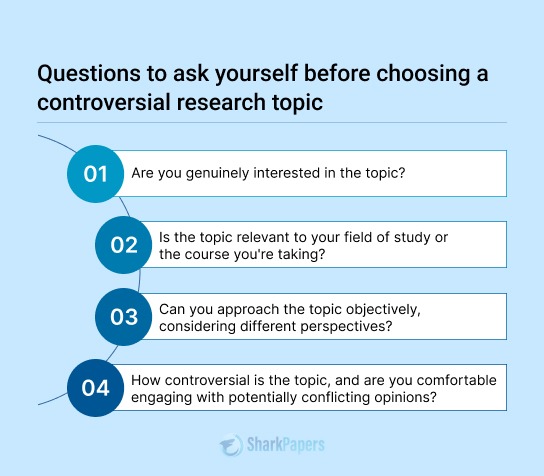
On this Page
Good Controversial Research Paper Topics for Students
Selecting a captivating research paper topic can make the research paper writing process more engaging and thought-provoking.
Here, we've curated a list of top research topics for students who are wondering what are some good controversial topics for a research paper.
Controversial Research Topics for Middle School
- Healthy School Lunches: Balancing Nutrition and Taste
- Should Students Have Homework on Weekends?
- Banning Junk Food in Schools: Pros and Cons
- Space Exploration: Is It Worth the Cost?
- The Importance of Environmental Conservation
- Community Service: Should It Be a Mandatory School Requirement?
- Is Censorship in Children's Literature Important?
- School Start Times: Are They Too Early?
- Should Students Be Allowed to Grade Their Teachers?
- Should Middle Schoolers Be Taught Financial Literacy?
Controversial Research Topics for High School Students
- Should High School Curriculum Include Mandatory Financial Literacy Courses?
- Exploring the Controversies Surrounding School Prayer
- The Influence of Violent VideoGames on Youth Behavior
- Should High School Start Times be Adjusted for Teenage Sleep Patterns?
- The Impact of Fast Food Advertising on Teenage Diets
- Debunking or Validating Popular Health Fads Among High School Students
- The Controversy Over Abstinence-only Education About Sex in High Schools
- The Role of Standardized Testing in College Admissions: Fair or Unfair?
- Should High School Students Have a Say in the Curriculum?
- The Impact of Global Warming Facts and Education on High School Students
Controversial Research Topics for College Students
- The Impact of Cancel Culture on Free Speech
- The Ethics of AI Surveillance in Educational Institutions
- Exploring Cultural Appropriation in College Events
- Debunking or Validating Conspiracy Theories in College Curriculum
- The Intersection of Gender Identity and Campus Policies
- Examining the Controversies Surrounding College Admissions Testing
- Privacy Concerns in Online Learning Platforms for College Courses
- Evaluating the Impact of Social Media Influencers on College Students
- Legalizing Recreational Drugs: Implications for College Communities
- Analyzing the Influence of the Electoral College on College Debates and Discussions
Controversial Research Topics for University
- The Intersection of Technology and Privacy in the Digital Age
- The Impact of Universal Basic Income on Labor Markets and Society
- Debunking Pseudoscience: Challenges and Strategies
- The Role of Blockchain Technology in Reshaping Industries
- The Future of Work: Automation, AI, and the Changing Landscape of Employment
- Neuroethics: Ethical Considerations in Brain-Computer Interface Technologies
- Augmented Reality in Healthcare: Enhancing Patient Care or Ethical Concerns?
- Crisis Communication in the Age of Social Media: Challenges and Opportunities
- The Ethics of Using AI in Criminal Justice: Bias, Accountability, and Transparency
- Social Media Influencers and Digital Advertising Ethics

Paper Due? Why Suffer? That's our Job!
Controversial Research Topics for Master’s
- Implications of Synthetic Biology and Biohacking
- Quantum Internet: Privacy and Security Challenges
- Ethics of Autonomous Weapons and AI in Warfare
- Impact of Deepfake Technology on Media and Society
- The Intersection of Technology and Mental Health: Risks and Benefits
- Space Tourism: Ethical and Environmental Implications
- The Ethics of Data Brokers and Information Marketplaces
- Quantum Cryptography: Securing Communication in the Quantum Era
- The Future of Intellectual Property in the Age of AI and Robotics
- The Digital Divide: Addressing Inequities in Access to Technology
Controversial Research Topics for Ph.D.
- Digital Surveillance and Civil Liberties: A Comparative Analysis
- Ownership and Privacy of Genetic Data in the Genomic Era
- Legal and Ethical Aspects of Extraterrestrial Resource Utilization
- Ethics of Artificial General Intelligence (AGI) Development and Deployment
- Regulatory Challenges of Decentralized Finance (DeFi)
- Algorithmic Trading, High-Frequency Trading, and Market Manipulation
- Big Tech's Influence on Global Politics and Governance
- Transhumanism and the Evolution of Post-Human Society
- The Intersection of Robotics and Human Rights: Ethical Considerations in Autonomous Systems
- Neurotechnology and the Possibility of Mind Reading: Ethical Implications
Common Controversial Research Paper Topics
- The Ethics of Genetic Editing: Balancing Innovation and Morality
- Climate Change: Addressing Skepticism and Urgency for Affirmative Action
- The Legality and Ethics of Euthanasia in Modern Society
- Concealed Handguns: Balancing Second Amendment and Civil Rights
- The Controversy Surrounding Biofuels
- Legalization of Recreational Drugs: Weighing the Risks and Benefits
- The Impact of Immigration Policies on Society and the Economy
- Nuclear Energy vs. Renewable Energy: Striving for a Sustainable Future
- Censorship in Media: Protecting Society or Limiting Freedom of Expression?
- The Death Penalty: Examining Morality and Effectiveness in Criminal Justice
Easy Controversial Research Paper Topics
- Should Schools Adopt Year-Round Bilingual Education?
- The Impact of Social Media Dependency on Personal Relationships
- Fast Food Consumption: Pros and Cons
- The Effectiveness of Capital Punishment as a Deterrent to Crime
- The Influence of Reality TV on Youth Behavior
- Should Animal Testing be Banned?
- The Impact of Video Games Violence on Academic Performance
- Marijuana Legalization and its Ethical Aspects
- Should Smoking in Public be Illegal?
- The Impact of Cell Phones on Face-to-Face Communication
Interesting Controversial Topics
- The Philosophy of Time Travel: Possibilities and Paradoxes
- Human Colonization of Mars: Ethical and Practical Considerations
- Cryptids and the Paranormal: Scientific Exploration or Pseudoscience?
- The Mandela Effect: Collective Memory or Alternate Realities?
- Existence of Parallel Universes: Exploring Multiverse Theories
- Plant Consciousness: Do Plants Have Feelings and Awareness?
- The Mystery of Dark Matter and Dark Energy
- Dream Interpretation: Psychology or Pseudoscience?
- Astrology and Personality Traits: Cosmic Influences on Atheism?
- The Hollow Earth Theory: Myth or Scientific Possibility?
Captivating Controversial Research Topics
- Mind-Reading Technology and Privacy Paradox
- Designer Babies: Crafting the Perfect Human
- Parallel Universes: Theoretical Marvel or Scientific Reality?
- Crypto-Currencies and the Future of Money Laundering
- Artificial Consciousness: From Code to Sentience
- Psychedelics in Psychiatry: Breaking the Taboo
- Deepfake Dilemmas: The Ethics of Synthetic Media
- Algorithmic Bias: Unmasking the Hidden Prejudice in Code
- Conscious AI in the Workplace: Colleague or Competitor?
- Rejuvenation Biotechnology: Extending Human Lifespan
Psychology Controversial Research Paper Topics
Here are some important controversial topics in psychology for research paper writing:
- The Morality of Using Placebos in Psychological Treatment
- The Ethics of Conducting Psychological Experiments on Animals
- Is Video Game Addiction a Real Mental Health Concern?
- The Influence of Parenting Styles on Child Development
- The Role of Genetics in Determining Intelligence
- Is Electroconvulsive Therapy (ECT) an Ethical Treatment for Depression?
- The Psychology of Procrastination: Causes and Solutions
- The Influence of Gender Stereotypes on Mental Health
- The Relationship Between Sleep Deprivation and Cognitive Functioning
- The Psychology Behind Conspiracy Theories: Understanding Beliefs and Behavior
Controversial Medical Topics For A Research Paper
- The Ethics of Human Cloning
- Physician-Assisted Suicide: Legal and Ethical Perspectives
- Gene Editing and CRISPR Technology: Ethical Implications
- The Legalization of Recreational Drugs for Medicinal Purposes
- Organ Transplant Allocation: Fairness and Equality
- Genetic Testing for Disease Predisposition: Privacy and Consent
- Stem Cell Research: Promises and Ethical Concerns
- Would Universal Healthcare Improve Healthcare Access?
- Pharmaceutical Industry Influence on Medical Practices
- Abortion: Medical, Ethical, and Legal Considerations
Simple Controversial Topics in History for Research Paper
- The Debate Over Reparations for Historical Injustices
- The Controversies Surrounding Columbus Day
- The Impact of Colonialism on Indigenous Peoples
- Historical Revisionism in Holocaust Denial
- The Legacy and Controversies of Historical Figures
- The Decision to Drop Atomic Bombs on Hiroshima and Nagasaki
- Historical Perspectives on Immigration Policies and Debates
- The Armenian Genocide: Recognition and Denial
- The Legacy and Controversies of the Vietnam War
- The Ethics of Archaeological Discoveries and Cultural Heritage Preservation
Tough Essay Due? Hire Tough Writers!
Unique Controversial Topics
- Universal Basic Income (UBI): Economic Panacea or Social Pitfall?
- Alternative Medicine vs. Conventional Medicine
- Urban Vertical Farming: Feeding Cities of the Future or Just a Pipe Dream?
- E-Waste Crisis: The Dark Side of Technological Advancement
- Water Scarcity and Corporate Control: Bottling Profits or Human Rights?
- Challenges of 5G Technology: Innovation or Health Concerns?
- Eradicating Infectious Diseases: Ethical Dilemmas in Gene Drives
- The Ethics of Behavioral Advertising: Personalized Marketing or Invasive Manipulation?
- Robot Rights: Navigating the Ethical Landscape of AI Personhood
- The Future of Nuclear Energy: Sustainable Solution or Perpetuating Risks
Other than this range of controversial topics, here are some non-controversial topics too:
Non Controversial Research Paper Topics
- The History of Public Libraries: Evolution and Impact on Communities
- Effects of Music on Stress and Anxiety Levels
- Benefits of Green Spaces in Urban Environments
- The Role of Vitamin D in Human Health
- History of Vaccinations and Their Impact on Public Health
- The Science of Sleep: Understanding Sleep Patterns and Disorders
- Positive Effects of Mindfulness Meditation on Mental Health
- The Impact of Reading on Cognitive Development in Children
- Advancements in Water Purification Technologies
- The History of Astronomy: Contributions and Discoveries
How to Choose a Controversial Research Paper Topic?
Choosing a controversial research paper topic requires careful consideration and a strategic approach to ensure the relevance and impact of your work.
Here are key steps to guide you in selecting a provocative and engaging topic for your research:
- Identify Your Interests: Start by considering your personal interests and passions. A controversial topic is more compelling when it aligns with your genuine curiosity. Explore subjects that you are willing to investigate thoroughly.
- Review Current Debates: Reading reputable news sources, scholarly articles, and opinion pieces will help you identify topics generating controversy and public discourse.
- Evaluate Academic Relevance: Ensure that your chosen topic has academic merit. It should be relevant to your field of study and contribute meaningfully to existing knowledge.
- Check Research Feasibility: Assess the feasibility of conducting research on your chosen topic. Ensure that there are accessible resources, data, and literature available for a comprehensive analysis.
- Consider Ethical Implications: Controversial topics may involve sensitive issues. Strive to approach the topic with empathy, respect for diverse opinions, and a commitment to presenting a balanced perspective.
- Stay Open to Adaptations: The dynamic nature of controversial topics may require adjustments to ensure the relevancy and significance of your findings. That’s why it is important to remain open to adapting your approach.
To sum up, looking into controversial topics lets us dig into complicated problems, have conversations, and question our existing knowledge. These interesting subjects grab people's attention and add to the broader perspectives of research.
This blog is your ultimate guide for controversial research paper topic selection. But if you feel like you need help with your topic or even research paper, reach our professional paper writing service online !
At SharkPapers.com, we have the expertise and experience to help you with research paper writing. We also provide freebies along with 24/7 customer support!
Visit our website and learn more about hiring research paper writing help!

Marketing, Literature
Donna writes on a broad range of topics, but she is mostly passionate about social issues, current events, and human-interest stories. She has received high praise for her writing from both colleagues and readers alike. Donna is known in her field for creating content that is not only professional but also captivating.
Was This Blog Helpful?
Keep reading.
- Learning How to Write a Research Paper: Step-by-Step Guide
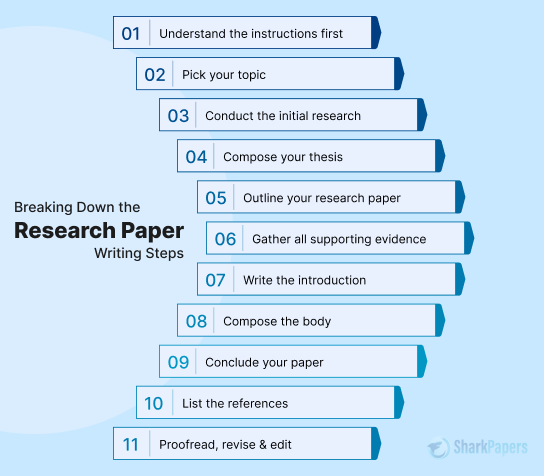
- Best 300+ Ideas For Research Paper Topics in 2024
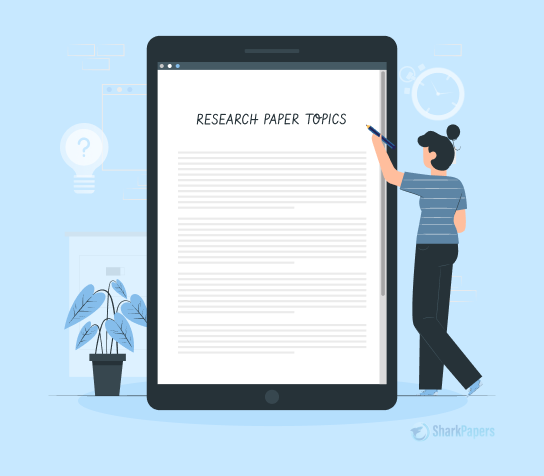
- A Complete Guide to Help You Write a Research Proposal
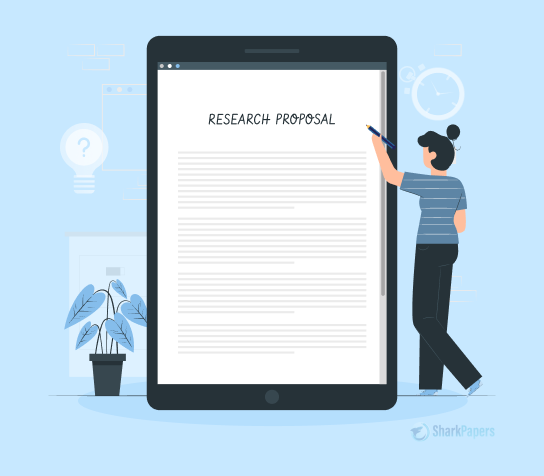
- The Definitive Guide on How to Start a Research Paper
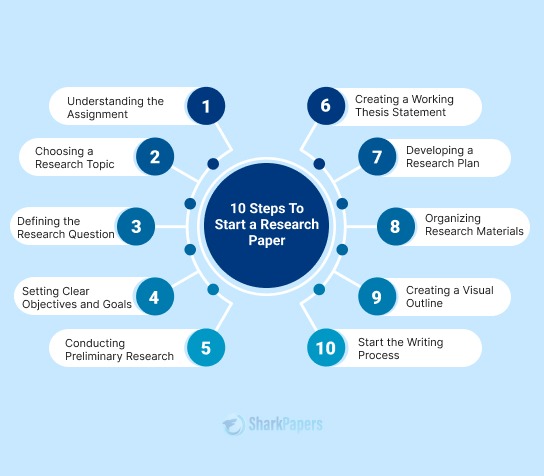
- How To Write An Introduction For A Research Paper - A Complete Guide
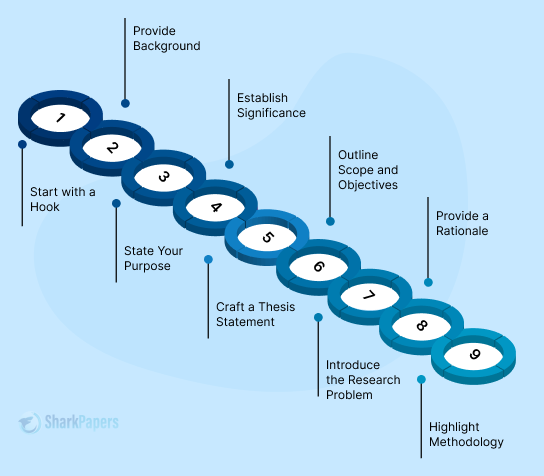
- Learn How To Write An Abstract For A Research Paper with Examples and Tips
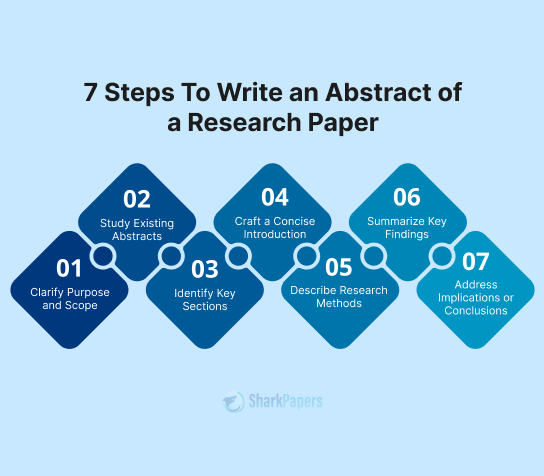
- How to Write a Literature Review for a Research Paper | A Complete Guide
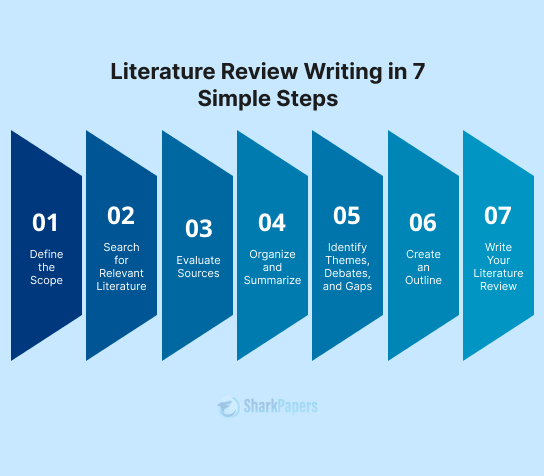
- How To Write The Methods Section of A Research Paper
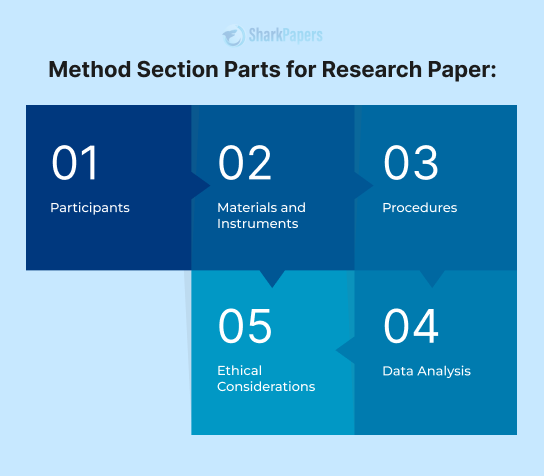
- How to Write a Research Paper Thesis: A Detailed Guide
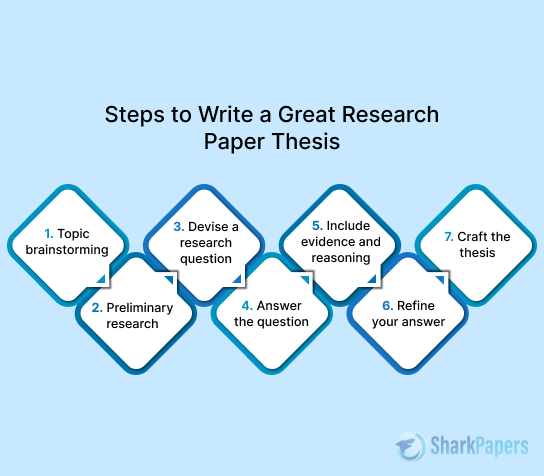
- How to Write a Research Paper Title That Stands Out

- A Detailed Guide on How To Write a Conclusion for a Research Paper
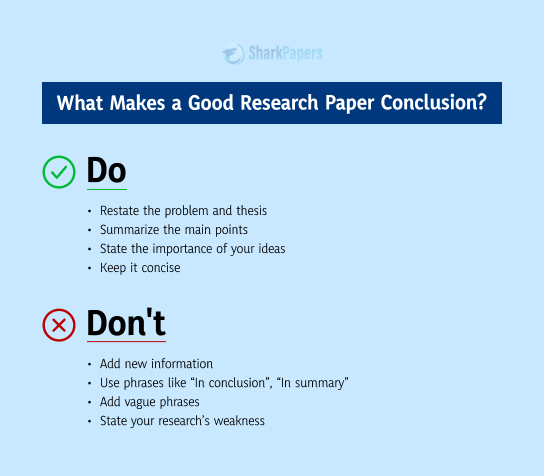
- How To Write The Results Section of A Research Paper | Steps & Tips
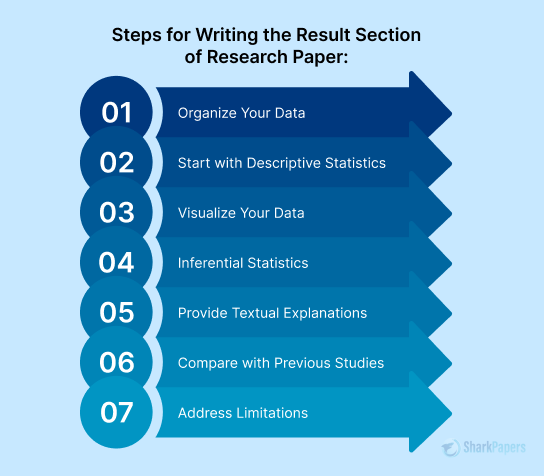
- How to Problem Statement for a Research Paper: An Easy Guide
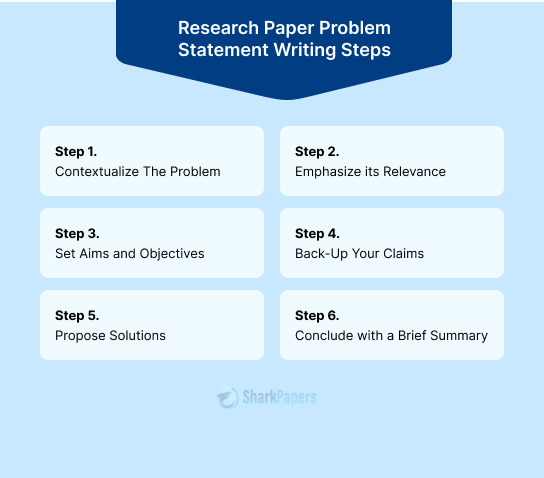
- How to Find Credible Sources for a Research Paper
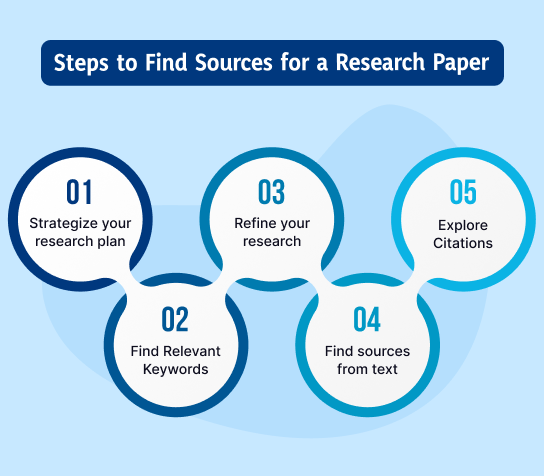
- A Detailed Guide: How to Write a Discussion for a Research Paper
)
- How To Write A Hypothesis In A Research Paper - A Simple Guide
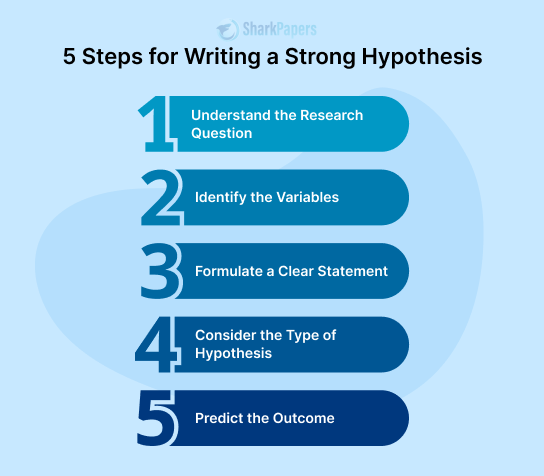
- Learn How To Cite A Research Paper in Different Formats: The Basics
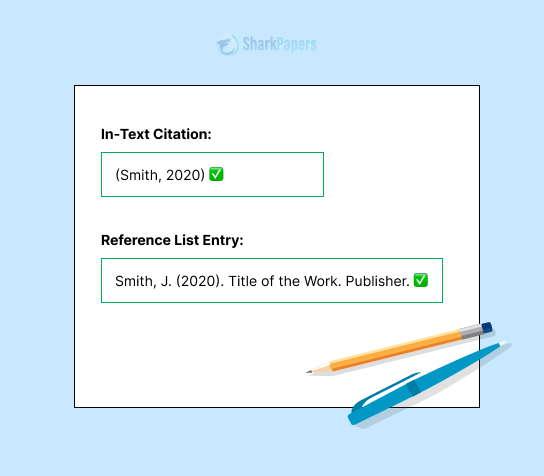
- The Ultimate List of Ethical Research Paper Topics in 2024
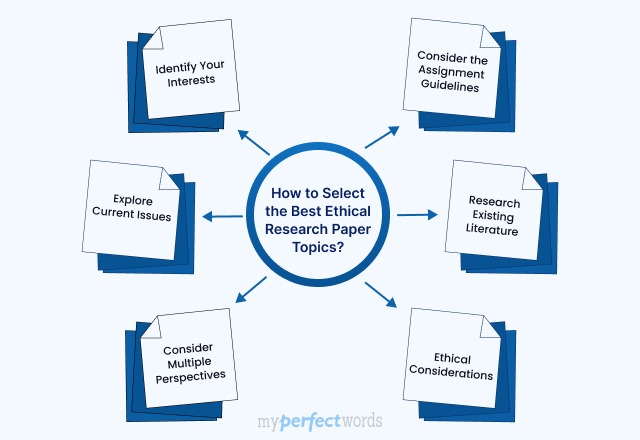
- How to Edit Research Papers With Precision: A Detailed Guide
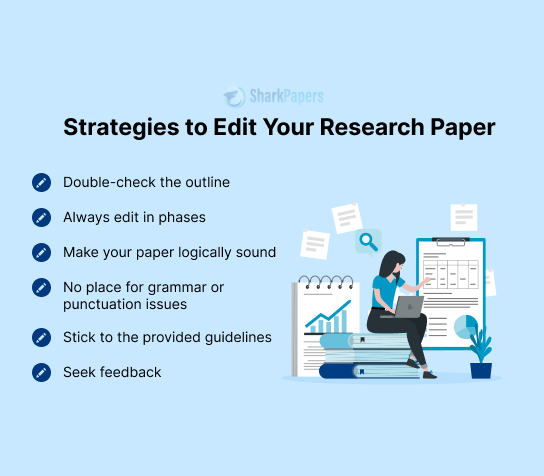
- A Comprehensive List of Argumentative Research Paper Topics
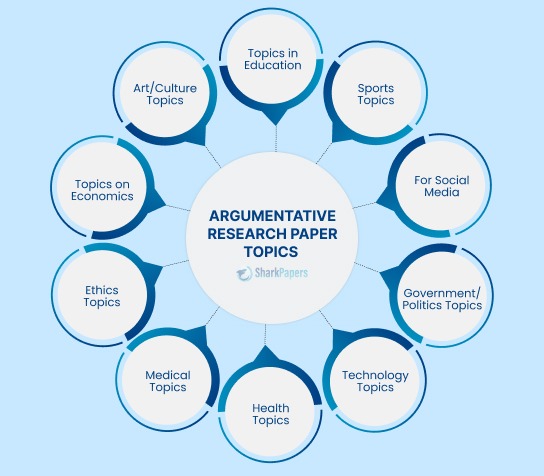
- A Detailed List of Amazing Art Research Paper Topics
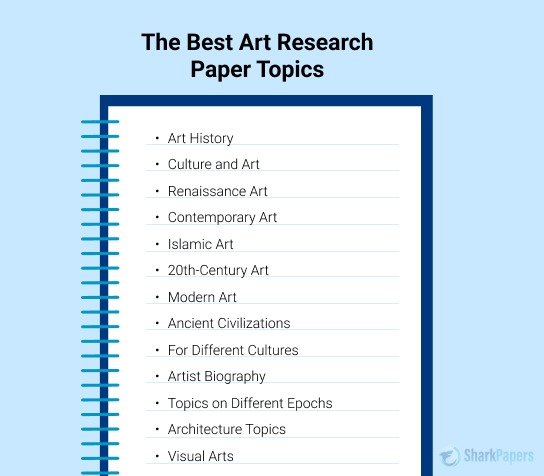
- Diverse Biology Research Paper Topics for Students: A Comprehensive List
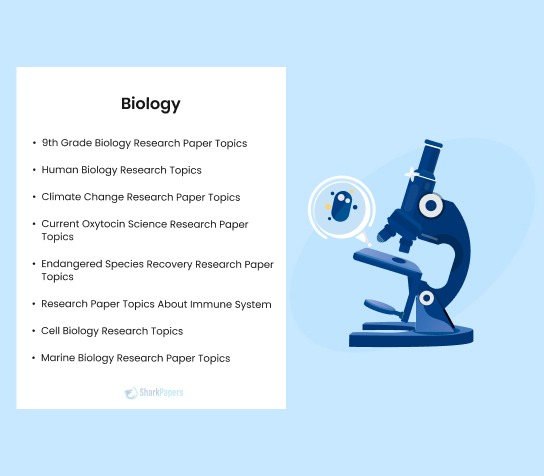
- 230 Interesting and Unique History Research Paper Topics
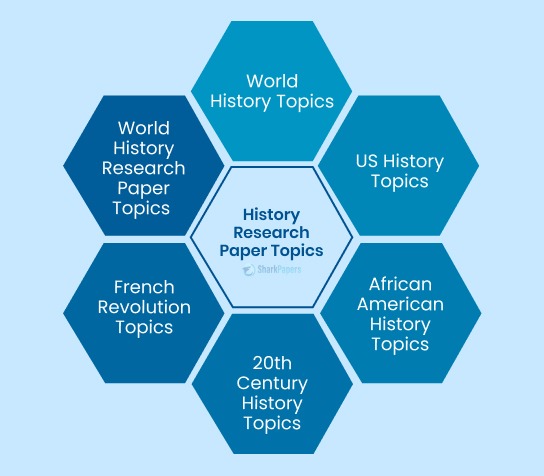
- 190 Best Business Research Paper Topics
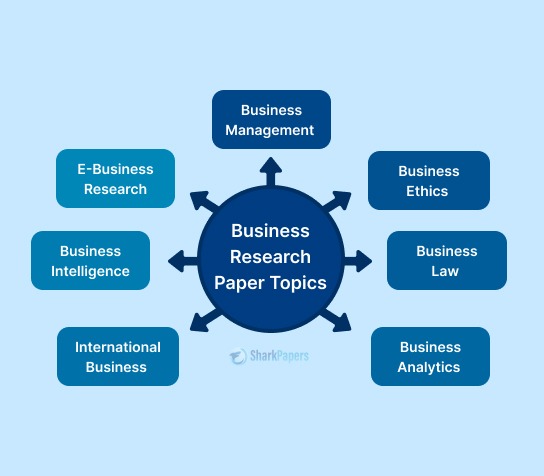
- 200+ Engaging and Novel Literature Research Paper Topics
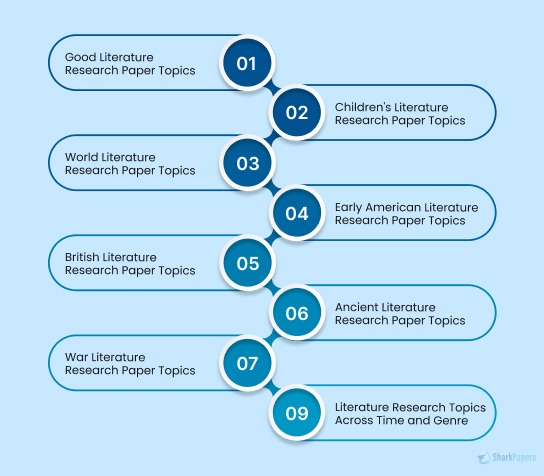
- A Guide on How to Write a Social Science Research
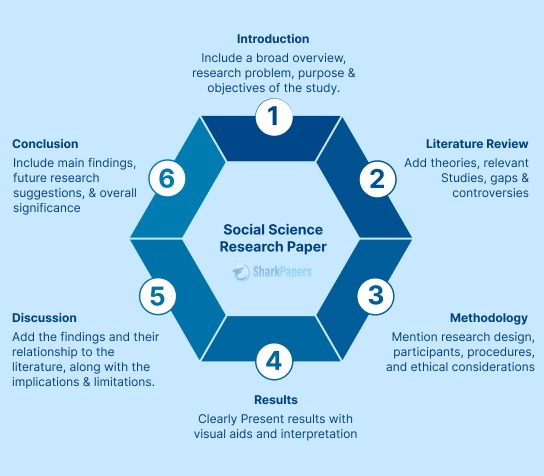
- Sociology Research Papers: Format, Outline, and Topics
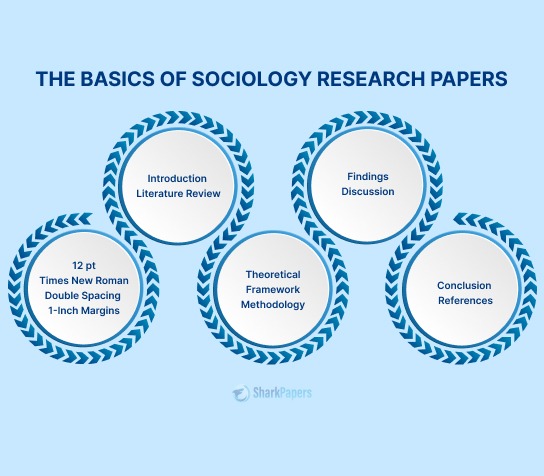
- Understanding the Basics of Biology Research Papers
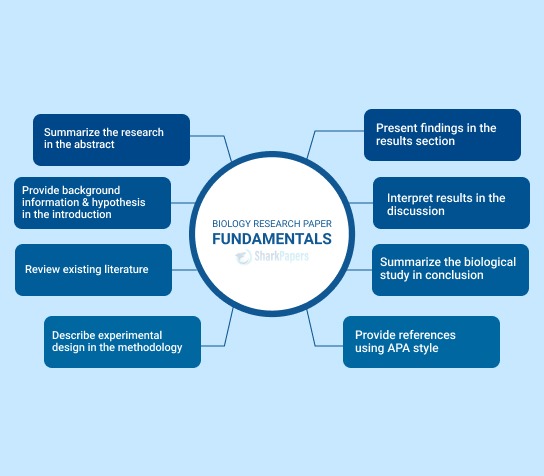
- How to Write a Psychology Research Paper: Guide with Easy Steps
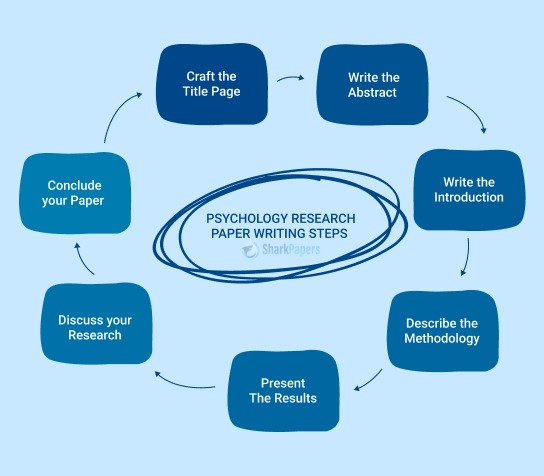
- Exploring the Different Types of Research Papers: A Guide
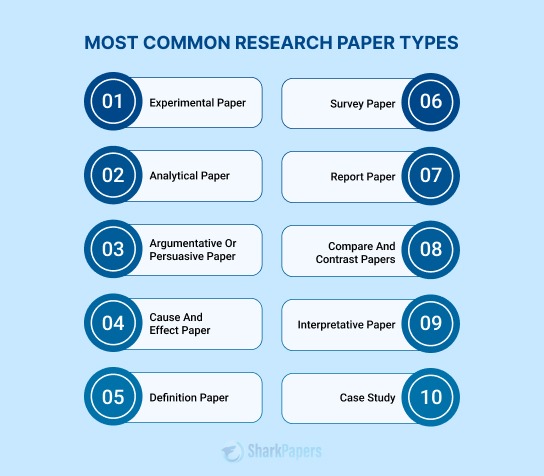
People Also Read
- how to title an essay
- chicago style
- article review
- acs citation
Burdened With Assignments?

Advertisement
© 2024 - All rights reserved
2000+ SATISFIED STUDENTS
95% Satisfaction RATE
30 Days Money Back GUARANTEE
95% Success RATE
Privacy Policy | Terms & Conditions | Contact Us
© 2021 SharkPapers.com(Powered By sharkpapers.com). All rights reserved.
© 2022 Sharkpapers.com. All rights reserved.
LOGIN TO YOUR ACCOUNT
SIGN UP TO YOUR ACCOUNT
- Your phone no.
- Confirm Password
- I have read Privacy Policy and agree to the Terms and Conditions .
FORGOT PASSWORD
- SEND PASSWORD
- Bipolar Disorder
- Therapy Center
- When To See a Therapist
- Types of Therapy
- Best Online Therapy
- Best Couples Therapy
- Best Family Therapy
- Managing Stress
- Sleep and Dreaming
- Understanding Emotions
- Self-Improvement
- Healthy Relationships
- Student Resources
- Personality Types
- Guided Meditations
- Verywell Mind Insights
- 2023 Verywell Mind 25
- Mental Health in the Classroom
- Editorial Process
- Meet Our Review Board
- Crisis Support
Controversial and Unethical Psychology Experiments
Kendra Cherry, MS, is a psychosocial rehabilitation specialist, psychology educator, and author of the "Everything Psychology Book."
:max_bytes(150000):strip_icc():format(webp)/IMG_9791-89504ab694d54b66bbd72cb84ffb860e.jpg)
Shereen Lehman, MS, is a healthcare journalist and fact checker. She has co-authored two books for the popular Dummies Series (as Shereen Jegtvig).
:max_bytes(150000):strip_icc():format(webp)/Shereen-Lehman-MS-1000-b8eb65ee2fd1437094f29996bd4f8baa.jpg)
There have been a number of famous psychology experiments that are considered controversial, inhumane, unethical, and even downright cruel—here are five examples. Thanks to ethical codes and institutional review boards, most of these experiments could never be performed today.
At a Glance
Some of the most controversial and unethical experiments in psychology include Harlow's monkey experiments, Milgram's obedience experiments, Zimbardo's prison experiment, Watson's Little Albert experiment, and Seligman's learned helplessness experiment.
These and other controversial experiments led to the formation of rules and guidelines for performing ethical and humane research studies.
Harlow's Pit of Despair
Psychologist Harry Harlow performed a series of experiments in the 1960s designed to explore the powerful effects that love and attachment have on normal development. In these experiments, Harlow isolated young rhesus monkeys, depriving them of their mothers and keeping them from interacting with other monkeys.
The experiments were often shockingly cruel, and the results were just as devastating.
The Experiment
The infant monkeys in some experiments were separated from their real mothers and then raised by "wire" mothers. One of the surrogate mothers was made purely of wire.
While it provided food, it offered no softness or comfort. The other surrogate mother was made of wire and cloth, offering some degree of comfort to the infant monkeys.
Harlow found that while the monkeys would go to the wire mother for nourishment, they preferred the soft, cloth mother for comfort.
Some of Harlow's experiments involved isolating the young monkey in what he termed a "pit of despair." This was essentially an isolation chamber. Young monkeys were placed in the isolation chambers for as long as 10 weeks.
Other monkeys were isolated for as long as a year. Within just a few days, the infant monkeys would begin huddling in the corner of the chamber, remaining motionless.
The Results
Harlow's distressing research resulted in monkeys with severe emotional and social disturbances. They lacked social skills and were unable to play with other monkeys.
They were also incapable of normal sexual behavior, so Harlow devised yet another horrifying device, which he referred to as a "rape rack." The isolated monkeys were tied down in a mating position to be bred.
Not surprisingly, the isolated monkeys also ended up being incapable of taking care of their offspring, neglecting and abusing their young.
Harlow's experiments were finally halted in 1985 when the American Psychological Association passed rules regarding treating people and animals in research.
Milgram's Shocking Obedience Experiments
Isabelle Adam/Flickr/CC BY-NC-ND 2.0
If someone told you to deliver a painful, possibly fatal shock to another human being, would you do it? The vast majority of us would say that we absolutely would never do such a thing, but one controversial psychology experiment challenged this basic assumption.
Social psychologist Stanley Milgram conducted a series of experiments to explore the nature of obedience . Milgram's premise was that people would often go to great, sometimes dangerous, or even immoral, lengths to obey an authority figure.
The Experiments
In Milgram's experiment, subjects were ordered to deliver increasingly strong electrical shocks to another person. While the person in question was simply an actor who was pretending, the subjects themselves fully believed that the other person was actually being shocked.
The voltage levels started out at 30 volts and increased in 15-volt increments up to a maximum of 450 volts. The switches were also labeled with phrases including "slight shock," "medium shock," and "danger: severe shock." The maximum shock level was simply labeled with an ominous "XXX."
The results of the experiment were nothing short of astonishing. Many participants were willing to deliver the maximum level of shock, even when the person pretending to be shocked was begging to be released or complaining of a heart condition.
Milgram's experiment revealed stunning information about the lengths that people are willing to go in order to obey, but it also caused considerable distress for the participants involved.
Zimbardo's Simulated Prison Experiment
Darrin Klimek / Getty Images
Psychologist Philip Zimbardo went to high school with Stanley Milgram and had an interest in how situational variables contribute to social behavior.
In his famous and controversial experiment, he set up a mock prison in the basement of the psychology department at Stanford University. Participants were then randomly assigned to be either prisoners or guards. Zimbardo himself served as the prison warden.
The researchers attempted to make a realistic situation, even "arresting" the prisoners and bringing them into the mock prison. Prisoners were placed in uniforms, while the guards were told that they needed to maintain control of the prison without resorting to force or violence.
When the prisoners began to ignore orders, the guards began to utilize tactics that included humiliation and solitary confinement to punish and control the prisoners.
While the experiment was originally scheduled to last two full weeks it had to be halted after just six days. Why? Because the prison guards had started abusing their authority and were treating the prisoners cruelly. The prisoners, on the other hand, started to display signs of anxiety and emotional distress.
It wasn't until a graduate student (and Zimbardo's future wife) Christina Maslach visited the mock prison that it became clear that the situation was out of control and had gone too far. Maslach was appalled at what was going on and voiced her distress. Zimbardo then decided to call off the experiment.
Zimbardo later suggested that "although we ended the study a week earlier than planned, we did not end it soon enough."
Watson and Rayner's Little Albert Experiment
If you have ever taken an Introduction to Psychology class, then you are probably at least a little familiar with Little Albert.
Behaviorist John Watson and his assistant Rosalie Rayner conditioned a boy to fear a white rat, and this fear even generalized to other white objects including stuffed toys and Watson's own beard.
Obviously, this type of experiment is considered very controversial today. Frightening an infant and purposely conditioning the child to be afraid is clearly unethical.
As the story goes, the boy and his mother moved away before Watson and Rayner could decondition the child, so many people have wondered if there might be a man out there with a mysterious phobia of furry white objects.
Controversy
Some researchers have suggested that the boy at the center of the study was actually a cognitively impaired boy who ended up dying of hydrocephalus when he was just six years old. If this is true, it makes Watson's study even more disturbing and controversial.
However, more recent evidence suggests that the real Little Albert was actually a boy named William Albert Barger.
Seligman's Look Into Learned Helplessness
During the late 1960s, psychologists Martin Seligman and Steven F. Maier conducted experiments that involved conditioning dogs to expect an electrical shock after hearing a tone. Seligman and Maier observed some unexpected results.
When initially placed in a shuttle box in which one side was electrified, the dogs would quickly jump over a low barrier to escape the shocks. Next, the dogs were strapped into a harness where the shocks were unavoidable.
After being conditioned to expect a shock that they could not escape, the dogs were once again placed in the shuttlebox. Instead of jumping over the low barrier to escape, the dogs made no efforts to escape the box.
Instead, they simply lay down, whined and whimpered. Since they had previously learned that no escape was possible, they made no effort to change their circumstances. The researchers called this behavior learned helplessness .
Seligman's work is considered controversial because of the mistreating the animals involved in the study.
Impact of Unethical Experiments in Psychology
Many of the psychology experiments performed in the past simply would not be possible today, thanks to ethical guidelines that direct how studies are performed and how participants are treated. While these controversial experiments are often disturbing, we can still learn some important things about human and animal behavior from their results.
Perhaps most importantly, some of these controversial experiments led directly to the formation of rules and guidelines for performing psychology studies.
Blum, Deborah. Love at Goon Park: Harry Harlow and the science of affection . New York: Basic Books; 2011.
Sperry L. Mental Health and Mental Disorders: an Encyclopedia of Conditions, Treatments, and Well-Being . Santa Barbara, CA: Greenwood, an imprint of ABC-CLIO, LLC; 2016.
Marcus S. Obedience to Authority An Experimental View. By Stanley Milgram. illustrated . New York: Harper &. The New York Times.
Le Texier T. Debunking the Stanford Prison Experiment . Am Psychol . 2019;74(7):823‐839. doi:10.1037/amp0000401
Fridlund AJ, Beck HP, Goldie WD, Irons G. Little Albert: A neurologically impaired child . Hist Psychol. 2012;15(4):302-27. doi:10.1037/a0026720
Powell RA, Digdon N, Harris B, Smithson C. Correcting the record on Watson, Rayner, and Little Albert: Albert Barger as "psychology's lost boy" . Am Psychol . 2014;69(6):600‐611. doi:10.1037/a0036854
Seligman ME. Learned helplessness . Annu Rev Med . 1972;23:407‐412. doi:10.1146/annurev.me.23.020172.002203
By Kendra Cherry, MSEd Kendra Cherry, MS, is a psychosocial rehabilitation specialist, psychology educator, and author of the "Everything Psychology Book."
Controversial information spreads faster and further than non-controversial information in Reddit
- Research Article
- Open access
- Published: 25 May 2021
- Volume 5 , pages 111–122, ( 2022 )
Cite this article
You have full access to this open access article

- Jasser Jasser 1 ,
- Ivan Garibay ORCID: orcid.org/0000-0002-3302-9382 2 ,
- Steve Scheinert 3 &
- Alexander V. Mantzaris 4
8594 Accesses
6 Citations
104 Altmetric
13 Mentions
Explore all metrics
Online users discuss and converse about all sorts of topics on social networks. Facebook, Twitter, Reddit are among many other networks where users can have this freedom of information sharing. The abundance of information shared over these networks makes them an attractive area for investigating all aspects of human behavior on information dissemination. Among the many interesting behaviors, controversiality within social cascades is of high interest to us. It is known that controversiality is bound to happen within online discussions. The online social network platform Reddit has the feature to tag comments as controversial if the users have mixed opinions about that comment. The difference between this study and previous attempts at understanding controversiality on social networks is that we do not investigate topics that are known to be controversial. On the contrary, we examine typical cascades with comments that the readers deemed to be controversial concerning the matter discussed. This work asks whether controversially initiated information cascades have distinctive characteristics than those not controversial in Reddit. We used data collected from Reddit consisting of around 17 million posts and their corresponding comments related to cybersecurity issues to answer these emerging questions. From the comparative analyses conducted, controversial content travels faster and further from its origin. Understanding this phenomenon would shed light on how users or organization might use it to their help in controlling and spreading a specific beneficiary message.
Similar content being viewed by others

Key Points in the Weibo Information Dissemination Process and Their Causal Mechanism: An Empirical Study of 30 High-Profile Opinion Incidents on Weibo
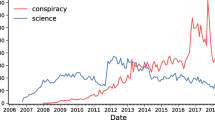
Conspiracy vs science: A large-scale analysis of online discussion cascades

Measuring Controversy in Social Networks Through NLP
Avoid common mistakes on your manuscript.
Introduction
The emergence of online social networks opened the door for many to amplify content freely. Much of this activity is benign or even positive. However, this openness formed a platform for the polarization of opinions and controversial discussions. There is active research into polarization on online social networks [ 2 , 11 , 23 ]. Controversiality of content is one feature that could draw attention to that content [ 15 ]. The spreading and promotion of controversial content support the polarization of social networks, especially in the political sphere [ 6 ]. A question naturally arises of whether such behavior is beneficial to the content’s promoter and that there is an incentive for the activity. This work investigates this question and whether controversy within a discussion would bring more user attention to authored content and promote the spread of the material further and faster.
Reddit is a popular online platform that allows users to spread knowledge and share opinions through posts consisting of both textual and visual elements. It allows users to respond to others’ posts by either commenting or voting for or against other users’ posts and comments, known as up- and down-votes [ 21 ]. Social media users display a tendency to join homogeneous communities that share the same beliefs and are dedicated to the same topic (echo chambers [ 12 , 22 ]). Reddit provides spaces, known as subreddits , where these discussions occur and which facilitate more focused discussion, and the presence of controversiality is genuine and not artificial. A study by the Pew Research Center (2013) concluded that 6% of online adults are Reddit users [ 9 ], and by the time of writing, Alexa Footnote 1 ranks it as #6 in the United States and #15 globally Footnote 2 .Reddit uses up- and down-votes to identify controversial content; with these votes representing agreement or disagreement, respectively, if the comment received a fair amount of polarized votes, then the comment is considered controversial. The identification of controversial content is determined by the Reddit’s formula for controversial comments, the final labeling for which is provided through the Reddit API. According to Reddit’s definition, a comment is controversial if 1) the sum of up- and down-votes is greater than or equal to 7, and 2) the ratio of up- and down-votes lies between selected upper ( ub = 0.6) and lower bounds ( lb = 0.4) as shown in equation ( 1 ). We found the algorithm responsible for identifying controversial comments in the reddit-archive repository in GitHub Footnote 3 .
Here \(C_i\) is the comment index and whether it is classified as controversial or not, while c is either the up- or down-votes ratio. Additionally, subreddit moderators may tag a post or comment as controversial, regardless of the number of votes. We assume that the tagging of a comment to be controversial is the result of users being invested in the discussion and that the polarization in the voting comes as users are swayed by some aspects of the discussion.
We rely on the definition and labeling of controversiality that Reddit applies to comments made on the platform. We understand the label to mean that there was attention to what is being discussed and there was a polarized reaction to the labeled comment. The measure of the effect of the resurgence of such labeled comments is studied by analyzing the characteristics of the posts’ cascades that contain these comments and those that do not, and by investigating the independent authors’ networks that forms these posts’ cascades. The results show that conversations that contain controversial content during the early stages of their lifetime possess more activity, and users involved in that conversation have a wider influence than conversations that are not labeled as controversial.
Related work
The concept of polarization and controversiality has been explored in multiple fields within the literature, from its identification in social networks and blogs [ 1 , 3 , 6 ] to its detection in online news and web pages [ 5 , 7 , 14 ]. There are two main themes of the research, the identification and quantification of controversy within the discussion. Other literature explores the effect of controversial information such as the work of [ 11 ], which studies the effect of collective attention on the evolution of controversial debates. The work of [ 18 ] explores the effect of the controversy on the emotions and language within online news.
The identification of controversy in social discussions is an area of on-going research with many different approaches to the identification of controversiality. The work of [ 5 ] identifies controversy within a topic by looking at the sentiment of the discussion and the range of sentiment polarity across the users involved in the controversy, as measured through natural language processing and sentiment analysis. Similarly in the work of [ 19 ], the authors proposed identifying controversial events by also considering the measurement of polarized opinions in the wake of a widely-viewed event. The work of [ 20 ] investigated opinion distribution in social media to identify controversial discussions and the size of their opinion groups.
Case studies that have attempted to quantify controversy and controversiality have focused on techniques and methods to measure the amount of controversy within a network or discussion. The work of [ 11 ] quantifies controversy in online echo chambers by considering a topic that is controversial and building the conversation graph of that topic which depicts the opinion alignment between the users. The authors then partition the graph to identify the sides of the controversy where the amount of controversy is measured from the characteristics of that graph. The work of [ 13 ], compares two types of social networks, those who are formed from polarized context and those who are not by analyzing the boundary between a pair of communities. The authors then distinguish between the polarized from the non-polarized communities by the concentration of high-degree nodes found in the boundary. The authors found that polarized networks tend to have low concentration “popular (high-degree)” nodes along the boundary between communities.
Data and Investigation
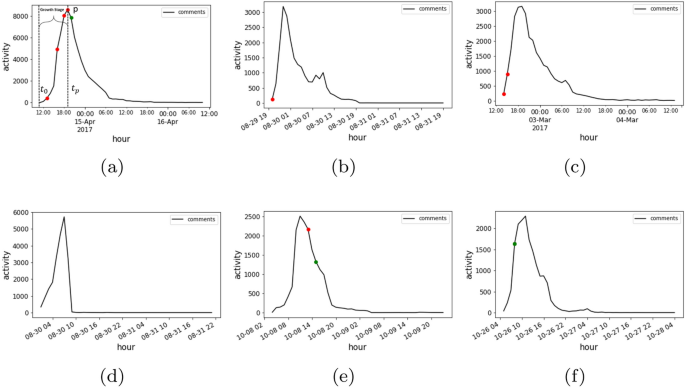
Controversially initiated and non-controversially initiated cascades, a – c are controversially initiated posts’ cascades while d – f are non-controversial posts’ cascades where the red dots represent a comment labeled as controversial by Reddit that is directed to the post’s author while a green dot is a comment labeled controversial by Reddit that is directed to another comment
The data used for this investigation is collected from Reddit and provided as part of the “Computational Simulation of Online Social Behavior (SocialSim)” DARPA program Footnote 4 . This vast dataset consists of more than 36 million comments on posts related to cybersecurity issues. For this study, we considered the posts in our dataset that have at least 100 comment. The number of posts collected is 47,940 where the total comments in those posts exceeded 17 million comments. the posts are then analyzed to be classified either as controversially initiated or non-controversial based on whether there exist any comments that are labeled controversial according to Reddit (as explained above) within the early stages of the posts. The classification yielded 23,101 posts that are labeled as controversially initiated, and 24,839 are labeled non-controversial. The distribution of controversial and non-controversial cascades from the same subreddits is almost equal in quantity. As an example, there are 8,528 controversial and 12,349 non-controversial cascades coming from the ‘ pcmasterrace ’ subreddit , and 5,450 controversial and 4,149 non-controversial cascades coming from the ‘ android ’ subreddit .
In social networks such as Reddit, users publish posts in regard of a specific topic where they share information and opinions. The posts are time stamped and so are the comments from the users that replied to that post. This forms a temporal propagation graph, also known as information cascade [ 4 , 17 ]. The classification of cascades is based on the enclosure of controversially labeled comments within the posts that form the cascade. Cascades have a growth stage which is the period between the time of the first comment ( \(t_0\) ) and the peak time ( \(t_p\) ) of the post’s cascade as shown in Fig. 1 a. We define a cascade that follows a post as controversial if the cascade contains a comment, directed to the post’s author, that is labeled controversial and occurred within the growth stage. Assuming that the discussion reached a level of polarity in the opinions within the growth stage of the cascade that drove the discussion. We do not consider controversial comments that happened after the growth stage since at that stage users have lost interest in the topic and the polarization did not reinvigorate the discussion. Fig. 1 shows posts’ cascades where Fig. 1 a-c are classified as controversial while Fig. 1 d-f are classified as non-controversial. Notice Fig. 1 e,f where in Fig. 1 e there are two controversial comments after its growth stage and for that it was classified as non-controversial, and in Fig. 1 f there is one controversial comment that is within the growth stage, however, it was not directed to the post’s author and so it was not classified as controversial.
In our assumption, when the Reddit algorithm labels a comment as controversial, it is a sign of collective attention [ 24 ] where users taking part in that discussion are still active and paying attention. The attention in large groups to the topics indicates popularity, where the popular the topic, the faster and further the information sharing and dissemination [ 24 ] The comments directed to the post author are more visible to the reader, thus poised to grab more attention, and for that, we prioritized them in our analyses. As an example, the largest cascade in our dataset (controversially initialized) is about a giveaway for a personal computer. Comments directed to the post’s author such as “Give it to meeeh Im poor,” and “Please for the love of God please pick me I never win anything” got attention with polarized responses and were labeled controversial by Reddit’s algorithm. The attention within this cascade drove it to end up having around 60,000 comments. While the largest non-controversial cascade was also concerning a personal computer giveaway, but it did not hold any controversially labeled comments directed to the post’s author and did not achieve the high amount of comments (around 23,000 comments) mentioned in the previous cascade. However, there are controversially labeled comments that are not directed to the post’s author and occurred after the growth stage of the cascade where the attention and discussion have decayed.
The data come with the sentiment polarity and subjectivity of the comments calculated using the “pattern.en” model Footnote 5 . The model ranks the polarity of the comment sentiment based on the contained adjectives on a scale from \(-1\) to 1 where \(-1\) means highly negative sentiment while 1 is a highly positive sentiment. The subjectivity is ranked by the model on a scale from 0 to 1 where 0 is very objective and 1 is very subjective. The sentiment polarity and subjectivity of the authors were calculated by taking the average sentiment of all comments written by that author. If an author wrote a comment that got labeled as controversial by Reddit, that author is labeled as controversial. The dataset contains 1,172,886 unique authors. Controversial authors consist of around 6% of that total or 69,607 authors to be precise. Figure 2 shows that authors that are labeled controversial tend to have balanced polarity that is normally distributed with a mean slightly above 0, meaning they are more likely to be positive in their comments. Unlike the controversial authors, non-controversial authors mostly have no sort of polarity in their text. putting a spike in their distribution at 0. However, like controversial authors, there is a smaller second peak that is slightly positive suggesting a bi-modal distribution. In terms of subjectivity, controversial authors tend to have a balance between being objective or subjective about the topic, hence their sentiment subjectivity average is closer to 0.5 while non-controversial authors have a normal distribution with a larger variance, but their peak is almost half the size of controversial authors’ distribution, and there is a sharp peak at 0 indicating more objectivity from that distribution.
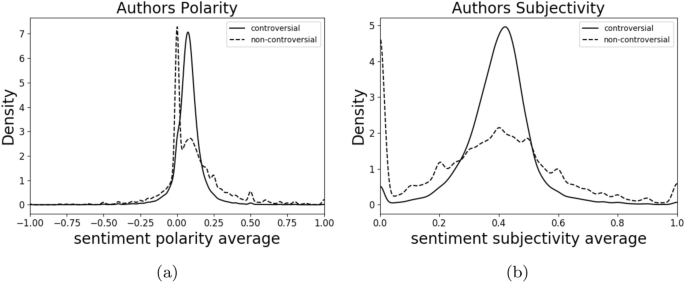
Authors’ averages of sentiment polarity and subjectivity, a shows the authors’ average for sentiment polarity while b shows the authors’ average for sentiment subjectivity
A social network is a form of complex network [ 10 ], a social structure that consists of social actors and the relationships between them. The relationship and connectedness between the actors define and distinguish those that are influencing the network from those who do not. The work of [ 16 ], argues that most influencers are found within the k -core of the network. A k -core is the “largest subgraph where vertices have at least k interconnections” [ 8 ]. We considered the independent authors that commented on each other comments for every post to measure the connectedness among them and discovering the subset of nodes with the highest coreness . This subset of authors defines the nodes responsible for influencing the dissemination of information. The k -core of that graph network is analyzed where k is max ( coreness ). We are interested in finding the number of nodes that are labeled controversial and their ratio within these k -cores.
We investigated whether the earlier the resurgence of the controversial comments within the cascade would lead to drastic changes in the characteristics by defining epochs within the growth stage of the cascade. The period is then divided into three epochs, epoch 1 for the first quartile, epoch 2 for the second quartile, and epoch 3 for the second half of the growth stage. If one of these epochs contains the majority of the controversial comments, we consider that epoch as the period with the highest concentration of controversy, and we associate the post’s cascade with that period. An epoch 1 cascade means that the cascade’s highest concentration of controversiality happened during the first quartile of the growth stage.
The results of the analysis show that posts’ cascades that contained controversially labeled messages during its growth stage produce a larger total number of comments and a larger burst, indicating more involvement from users. Another feature is that more unique users are involved in the cascades which is controversially labeled. This clearly shows that its beneficial for a user who seeks to spread a particular message faster and further, to infuse controversiality within the context of the message. The plots in Fig. 3 show this effect presented on three different measurements. Each plot is a CCDF (complementary cumulative distribution function) where the x -axis is the quantity in question shown in the title and the y -axis is the probability for that measure to exceed that x -axis value. In Fig. 3 a, shows that the posts that attract the largest contributions are dominated by initial signals of controversy. As the cascades grew, a difference emerged; non-controversial cascades did not exceed 25,000 comments whereas the controversial cascades did display posts having 60,000 or more comments. Figure 3 b shows the peak size probability where controversial cascades tend to generally have larger peaks. Figure 3 c shows the probability for cascades to exceed a certain number of unique authors contributing comments to a post. Along with this measure it can be seen how the controversially initiated cascades produce much larger values for the upper tail of the distribution.
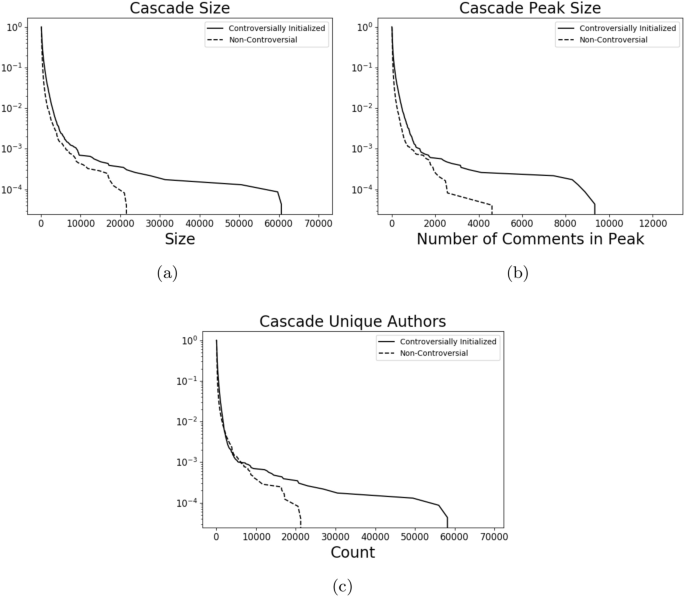
Descriptive analysis results of posts’ cascade, a shows the difference in size between controversially initiated post’s cascade and non-controversial one. b shows the difference in peak size, and c shows the difference in the number of unique authors
Figure 4 shows the results from conducting a network analysis on the post structure in the Reddit dataset. The results here show a more distinctive differentiation between the two types of cascades. Figure 4 a shows the CCDF for the network size of the controversially and non-controversially initiated cascades where the network size is computed by using the total number of edges produced within the entity of the post. Figure 4 b looks at the number of nodes within the defined k -core in the cascades’ network. It is clearly visible that controversial cascades end up containing more nodes within their k -core and so are the controversial nodes within these k -cores as shown in Fig. 4 c. This shows that network properties of the different cascades are more affected by content which attracts controversial initiations or that they shape the subsequent discussions.
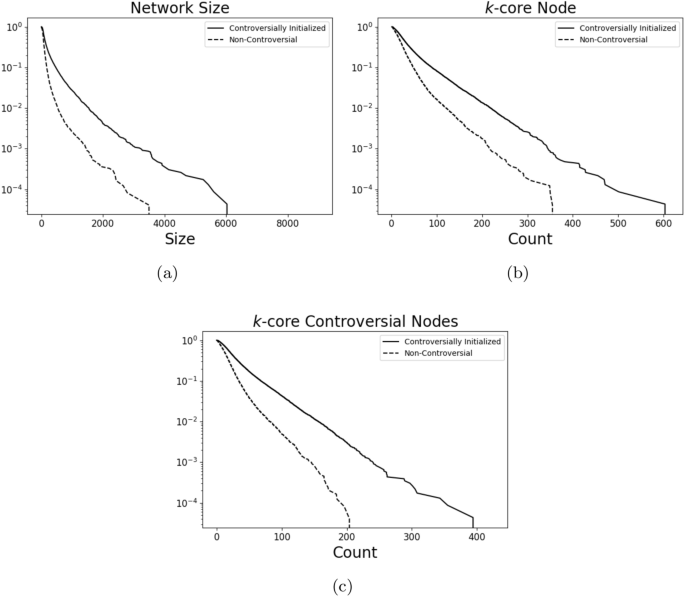
Network analysis results of posts’ cascade, a shows the difference in network size (number of edges) between controversially initiated post’s cascade and non-controversial one. b shows the difference in the number of nodes within the networks’ k -core, and c shows the difference in the number of controversial nodes within the networks’ k -core
Figure 5 shows an evolutional temporal analysis of the network changes within the first 24 h. Figure 5 a shows the evolution the number of links in the network. The activity for the controversial cascades is greater and for the time duration observed has this increase from each in the post creation. Figure 5 b shows the k -core evolution where the number of nodes within the controversial k -core increased drastically over the other ones. Figure 5 c compares the evolutional number of controversial nodes found within the k -core. This reinforces that the cascades which contain controversial activity during their early stages continue to swiftly progress for longer periods of time than the non-controversial cascades.
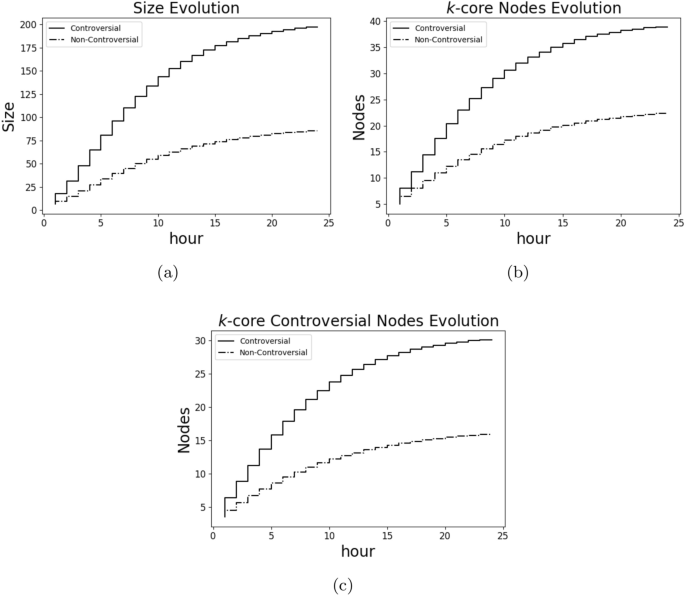
Network evolution analysis results of posts’ cascade, a shows the difference in network size (number of edges) hourly growth between controversially initiated post’s cascade and non-controversial one. b Shows the difference in the hourly growth of the number of nodes within the networks’ k -core, and c shows the difference in the hourly growth of the number of controversial nodes within the networks’ k -core
Figure 6 shows the results of comparing the first three epochs by the cascade size and the peak size of the cascade. Figure 6 a shows that epoch 1 controversial cascades produced the largest number of comments and peak size, followed by epoch 2 then epoch 3 cascades. This indicates that the earlier the resurgence of the controversiality within the cascade the further the information will disseminate within, while later resurgence of controversial comments might not drastically affect the information flow.
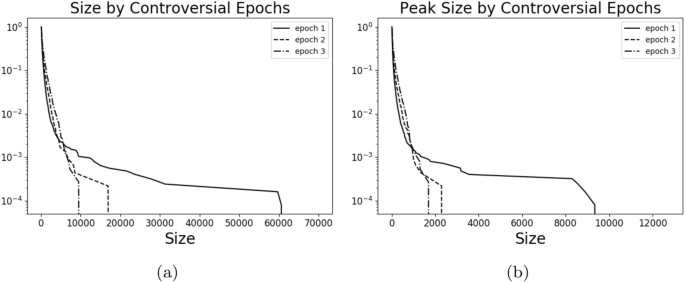
The posts’ cascades size and peaks size based on the epoch that contains the highest concentration of the controversial comments. a Shows the comparison of posts’ cascades size, while b shows the comparison of the peak size
The work sought to explore whether controversial content will have a greater chance of increased activity amongst other users. The analysis uses descriptive statistics and network analysis for the amount of activity a cascade produced. The k -core analysis conducted to study the structure of the networks’ core. The temporal dimension is also explored in an analysis of the evolution of contributors. The results show that content which was controversial is associated with higher degrees of activity. This can shed light on various marketing strategies for competing for attention online. Even if not completely understood as to why this occurs, it can be utilized by accounts on social media seeking to create more influence. It can also help explain the spread of disinformation.
A web traffic analysis company owned by Amazon
https://www.alexa.com/siteinfo/reddit.com
https://github.com/reddit-archive/reddit/blob/master/r2/r2/models/builder.py
https://www.darpa.mil/program/computational-simulation-of-online-social-behavior
https://www.clips.uantwerpen.be/clips.bak/pages/pattern-en#sentiment
Adamic, L. A., & Glance, N. (2005). The political blogosphere and the 2004 u.s. election: Divided they blog. In Proceedings of the 3rd International Workshop on Link Discovery, LinkKDD ’05, pp. 36–43. ACM, New York, NY, USA. https://doi.org/10.1145/1134271.1134277 . http://doi.acm.org/10.1145/1134271.1134277 .
Akoglu, L. (2014). Quantifying political polarity based on bipartite opinion networks. In Eighth International AAAI Conference on Weblogs and Social Media.
An, J., Quercia, D., & Crowcroft, J. (2014). Partisan sharing: Facebook evidence and societal consequences. In Proceedings of the Second ACM Conference on Online Social Networks, COSN ’14, pp. 13–24. ACM, New York, NY, USA. https://doi.org/10.1145/2660460.2660469 . http://doi.acm.org/10.1145/2660460.2660469 .
Bikhchandani, S., Hirshleifer, D., & Welch, I. (1992). A theory of fads, fashion, custom, and cultural change as informational cascades. Journal of Political Economy , 100 (5), 992–1026.
Article Google Scholar
Choi, Y., Jung, Y., & Myaeng, S. H. (2010). Identifying controversial issues and their sub-topics in news articles. In Pacific-Asia Workshop on Intelligence and Security Informatics, pp. 140–153. Springer.
Conover, M. D., Ratkiewicz, J., Francisco, M., Gonçalves, B., Menczer, F., & Flammini, A. (2011). Political polarization on twitter. In Fifth international AAAI conference on weblogs and social media.
Dori-Hacohen, S., & Allan, J. (2013). Detecting controversy on the web. In Proceedings of the 22nd ACM international conference on Conference on information & knowledge management, CIKM ’13, pp. 1845–1848. ACM, New York, NY, USA. https://doi.org/10.1145/2505515.2507877 . http://doi.acm.org/10.1145/2505515.2507877 .
Dorogovtsev, S. N., Goltsev, A. V., & Mendes, J. F. F. (2006). K-core organization of complex networks. Physical Review Letters , 96 (4), 040601.
Duggan, M., & Smith, A. (2013). 6% of online adults are reddit users. Pew Internet & American Life Project , 3 , 1–10.
Google Scholar
Easley, D., Kleinberg, J., et al. (2010). Networks, crowds, and markets (Vol. 8). Cambridge University Press Cambridge.
Garimella, K., Morales, G. D. F., Gionis, A., & Mathioudakis, M. (2018). Quantifying controversy on social media. ACM Transactions on Social Computing , 1 (1), 3.
Garrett, R. K. (2009). Echo chambers online? Politically motivated selective exposure among internet news users. Journal of Computer-Mediated Communication , 14 (2), 265–285.
Guerra, P. C., Meira Jr, W., Cardie, C., & Kleinberg, R. (2013). A measure of polarization on social media networks based on community boundaries. In Seventh International AAAI Conference on Weblogs and Social Media.
Kaplun, K., Leberknight, C., & Feldman, A. (2018). Controversy and sentiment: An exploratory study. In Proceedings of the 10th Hellenic Conference on Artificial Intelligence, SETN ’18, pp. 37:1–37:7. ACM, New York, NY, USA. https://doi.org/10.1145/3200947.3201016 . http://doi.acm.org/10.1145/3200947.3201016 .
Kim, J., Wyatt, R. O., & Katz, E. (1999). News, talk, opinion, participation: The part played by conversation in deliberative democracy. Political Communication , 16 (4), 361–385.
Kitsak, M., Gallos, L. K., Havlin, S., Liljeros, F., Muchnik, L., Stanley, H. E., et al. (2010). Identification of influential spreaders in complex networks. Nature Physics , 6 (11), 888.
Leskovec, J., Krause, A., Guestrin, C., Faloutsos, C., Faloutsos, C., VanBriesen, J., & Glance, N. (2007). Cost-effective outbreak detection in networks. In Proceedings of the 13th ACM SIGKDD international conference on Knowledge discovery and data mining, pp. 420–429. ACM.
Mejova, Y., Zhang, A. X., Diakopoulos, N., & Castillo, C. (2014). Controversy and sentiment in online news. arXiv preprint arXiv:1409.8152 .
Popescu, A. M., & Pennacchiotti, M. (2010). Detecting controversial events from twitter. In Proceedings of the 19th ACM International Conference on Information and Knowledge Management, CIKM ’10, pp. 1873–1876. ACM, New York, NY, USA. https://doi.org/10.1145/1871437.1871751 . http://doi.acm.org/10.1145/1871437.1871751 .
Qiu, J., Lin, Z., & Shuai, Q. (2019). Investigating the opinions distribution in the controversy on social media. Information Sciences , 489 , 274–288.
Stoddard, G. (2015). Popularity dynamics and intrinsic quality in reddit and hacker news. In Ninth International AAAI Conference on Web and Social Media.
Sunstein, C. R. (2001). Echo chambers: Bush V. Gore, impeachment, and beyond . Princeton, NJ: Princeton University Press.
Taylor, C., Mantzaris, A., & Garibay, I. (2018). Exploring how homophily and accessibility can facilitate polarization in social networks. Information , 9 (12), 325.
Wu, F., & Huberman, B. A. (2007). Novelty and collective attention. Proceedings of the National Academy of Sciences , 104 (45), 17599–17601. https://doi.org/10.1073/pnas.0704916104 . https://www.pnas.org/content/104/45/17599 .
Download references
Acknowledgements
This work was partially supported by grant FA8650-18-C-7823 from the Defense Advanced Research Projects Agency (DARPA). The views and opinions contained in this article are the authors and should not be construed as official or as reflecting the views of the University of Central Florida, DARPA, or the U.S. Department of Defense.
Author information
Authors and affiliations.
Department of Computer Science, University of Central Florida, Orlando, FL, USA
Jasser Jasser
Department of Industrial Engineering and Management Systems, University of Central Florida, Orlando, FL, USA
Ivan Garibay
Deloitte Consulting, LLC, Lake Mary, FL, USA
Steve Scheinert
Department of Statistics and Data Science, University of Central Florida, Orlando, FL, USA
Alexander V. Mantzaris
You can also search for this author in PubMed Google Scholar
Corresponding author
Correspondence to Ivan Garibay .
Ethics declarations
Conflict of interest.
The authors declare that they have no conflict of interest.
Additional information
Publisher's note.
Springer Nature remains neutral with regard to jurisdictional claims in published maps and institutional affiliations.
Rights and permissions
Open Access This article is licensed under a Creative Commons Attribution 4.0 International License, which permits use, sharing, adaptation, distribution and reproduction in any medium or format, as long as you give appropriate credit to the original author(s) and the source, provide a link to the Creative Commons licence, and indicate if changes were made. The images or other third party material in this article are included in the article's Creative Commons licence, unless indicated otherwise in a credit line to the material. If material is not included in the article's Creative Commons licence and your intended use is not permitted by statutory regulation or exceeds the permitted use, you will need to obtain permission directly from the copyright holder. To view a copy of this licence, visit http://creativecommons.org/licenses/by/4.0/ .
Reprints and permissions
About this article
Jasser, J., Garibay, I., Scheinert, S. et al. Controversial information spreads faster and further than non-controversial information in Reddit. J Comput Soc Sc 5 , 111–122 (2022). https://doi.org/10.1007/s42001-021-00121-z
Download citation
Received : 27 June 2020
Accepted : 26 April 2021
Published : 25 May 2021
Issue Date : May 2022
DOI : https://doi.org/10.1007/s42001-021-00121-z
Share this article
Anyone you share the following link with will be able to read this content:
Sorry, a shareable link is not currently available for this article.
Provided by the Springer Nature SharedIt content-sharing initiative
- Controversiality
- Information
- Polarization
- Find a journal
- Publish with us
- Track your research

Journal of Controversial Ideas
Welcome to the website of the Journal of Controversial Ideas , the first open access, peer-reviewed, interdisciplinary journal specifically created to promote free inquiry on controversial topics.
The Journal of Controversial Ideas offers a forum for careful, rigorous, unpolemical discussion of issues that are widely considered controversial, in the sense that certain views about them might be regarded by many people as morally, socially, or ideologically objectionable or offensive. The journal offers authors the option to publish their articles under a pseudonym, in order to protect themselves from threats to their careers or physical safety. We hope that this will also encourage readers to attend to the arguments and evidence in an essay rather than to who wrote it. Pseudonymous authors may choose to claim the authorship of their work at a later time, or to reveal it only to selected people (such as employers or prospective employers), or to keep their identity undisclosed indefinitely. Standard submissions using the authors’ actual names are also encouraged.
We welcome submissions in all areas of academic research insofar as the topics discussed are relevant to society at large.
We aim to publish papers that are likely to advance knowledge and promote free inquiry and rational argumentation. The main criterion for acceptance will be the quality of the arguments given.
We will consider articles that discuss issues or policies in non-Western cultures that may not be controversial in the West but are sufficiently controversial elsewhere that critically discussing them could endanger authors. We also welcome papers that discuss well-known controversial topics from diverse cultural, philosophical, moral, political, and religious perspectives.
We hope that this journal will show the value of embracing controversy as a means of getting closer to the truth, advancing knowledge, and reforming social and cultural paradigms. We believe, with John Stuart Mill, that even when mainstream views are true or justified, if they are never challenged, they risk becoming dead dogmas rather than living truths.
The Journal of Controversial Ideas is not affiliated with any institution and does not support any beliefs or doctrines other than freedom of thought and expression. It is privately funded through donations. Please consider making a donation, thereby helping us to promote free inquiry.
Thank you for visiting our website.
Jeff McMahan
Francesca Minerva
Peter Singer
Logo by Filippo Menghi
Recent publications
Journal browser.
- Current issue
- Vol. 1 (2021)
- Vol. 2 (2022)
- Vol. 3 (2023)
- Vol. 4 (2024)

Choose Your Test
Sat / act prep online guides and tips, the best controversial topics for debates and essays.
General Education

Controversial topics are a good choice for an essay or debate because they immediately draw in the reader or listener. The adage that “controversy sells” is so rooted in society that even the rapper Chamillionaire named his second album after it! Controversial issues are also a good topic because it’s easier to write a strong thesis and find sources to back up your argument . After all, when something is controversial, everybody wants to have their say over it.
However, it’s also important that you address controversial issues with sensitivity and care. Because controversial topics tend to raise emotions, you must walk a thin line between opinion and fact in order to build trust between you and your reader/listener.
In this article, we’re going to give you the best controversial topics you can use for essays and debates—and we’ll explain the controversies for you, too! We’ll also discuss when to use controversial topics, the pros and cons of choosing a controversial issue, and tips for making sure you’re treating a controversial topic with sensitivity and respect.
That’s a lot to cover, so let’s get started!

Controversial topics are issues that can really get people up in arms. (Yes, it's a dad joke. No, we're not sorry.)
What Are Controversial Topics?
If you’ve flipped on a television lately, you’ve probably seen people on the news arguing different sides of an issue. (Occasionally, these arguments can get pretty emotional!) When you see this happening, there’s a good chance that the people you’re watching are discussing a controversial topic.
Controversial debate topics include subjects that create strong differences of opinion. They are issues that can affect politics, society as a whole, individuals on a personal level, the environment, or any other area of life that people feel strongly about. Additionally, controversial issues often have no clear answer because people’s feelings and personal beliefs are often strongly involved.

3 Pros and 3 Cons of Using Controversial Topics in Essays or Debates
It might be tempting to pick any old controversial topic and run with it. Not so fast! While controversial topics definitely give you a lot to talk about in an essay or debate, there are some definite drawbacks to dealing with hot-button issues.
Here are the pros and cons you should consider before deciding to use a controversial topic in your work.
Pro #1: It’s Usually Easy to Find Sources
Everyone wants to have their say on controversial topics, which is great when you need sources to include in your paper! A quick library or Google search will turn up tons of information. It can make that part of writing (or preparing for a debate) much easier.
Con #1: It Can Be Hard to Find Good Sources
When you Google a controversial source, the results can be overwhelming. While you’re probably going to have tons of hits, they'll be from a wide range of sources like social media, personal blogs, podcasts, and message boards (like Reddit and Quora). Just because something appears high in a Google result doesn’t make it a good source that you can site in a paper or speech.
Good sources are ones that are written by credentialed authors (they are experts in their field) and include reliable, cited evidence. A good place to find good sources are scholarly databases, like JSTOR and ProQuest, since the articles on these databases have been vetted by other experts before they are published. Reputable news outlets can also be good resources, too.

Pro #2: It’s Easier to Talk About Things That Interest You
If you care about a topic you probably already know a little bit about it. This is especially true for many controversial issues. After all, they tend to be controversial because many people have opinions on them! If you pick a controversial issue that’s near and dear to your heart, you’ll find that you have a lot to say about it.
Con #2: It’s Hard to Keep Your Emotions In Check
If it is a topic you care about a lot, you probably already have strong opinions formed. But in order to build trust with your reader/listener and to be accurate, you need to use neutral language so that your reader/listener can draw their own conclusions based on your work. While it’s tempting to call people out or get heated, those are both pitfalls you should avoid .
Pro #3: Controversial Issues Capture Attention
Tackling a subject like mass incarceration, the death penalty, or abortion is a good way to get your audience to sit up and take notice. People want to hear your opinion to see how it does—or doesn’t—match their own.
Con #3: You Open Yourself Up to Criticism
On the flip side, if your argument doesn’t align with their beliefs, the people reading or listening to your argument may criticize your opinion or belief because it is not the same as theirs. You’ll have to spend extra time making sure you’ve created a strong argument since people have often spent more time thinking about a controversial topic and are better able to challenge your position.

How to Pick Good Controversial Topics for Teens
When picking what topic to write about, it’s important that you pick a good strong topic that is relevant and that has an amount of easy to find good sources. When deciding on a topic, try to keep these tips in mind!
Tip #1: Choose a Topic That Interests You
It’s easier to work on a subject you enjoy. Don’t use a topic you find boring or have no interest in. Write about a topic you are passionate about, since your own interest will shine through in your writing or speech. Also, when you pick a topic you like, the assignment can actually be fun. Imagine that!
Tip #2: Be Passionate...But Not Too Passionate
Stay away from topics where you might be too passionate about one side since it can be tough to distance yourself enough to see both sides of the argument. You’ll want to know what good arguments the other side has so that you can defend your position against them. If you're too passionate about a subject, you might miss key details that help you defend your position. Every side has good points—that’s why there’s an argument in the first place!
Tip #3: Make Sure There’s Hard Evidence
Pick a topic where there’s evidence, not just a “he said, she said” kind of thing. Avoid arguments that don’t have any facts or figures backing them up or they are entirely opinion based. Examples of topics that are controversial but lack compelling evidence include government conspiracies or theories that have been proven false, like the Earth being flat or that pineapple belongs on pizza (it doesn’t).

Tip #4: Know Your Audience
If you are writing about controversial debate topics, ask yourself who it is you are trying to persuade. Is it your teacher? A certain segment of the population? If you know who your audience is, you can better tailor your argument to hit on the points they care about.
For example, say you’re writing an essay about how teacher’s unions are unnecessary. If your audience is your teacher—who's probably in a union!—you’re going to have to work harder to prove your point since they’re more likely to be in favor of unions. (You’ll also need to make sure you’re being fair and respectful to avoid offending your teacher. We’ll talk more about how to do that in a minute.)
In the example above, knowing your audience can (and should) change the way you write your argument in order to make it as persuasive and convincing as possible.
Tip #5: Narrow Down Your Topic
Make sure your topic is broad enough that you have plenty of information sources to choose from but narrow enough that you aren’t overwhelmed by the amount of information. An easy way to narrow a broad topic is to limit it to a time period or geographical location. For instance, let’s say that you want to write an argumentative essay about climate change. Climate change covers a lot of ground, so you could narrow it down to only writing about climate change in the last 15 years. You could narrow it down even more by writing about how climate change has affected a small geographical location, like California or your own city, in the last 15 years.

Gun control is a perennially controversial topic in the United States.
The Best Controversial Topics of 2019
Here are some of the most controversial topics discussed this year. Many of these issues are evergreen topics, which means you’ll be able to find plenty of information for them!
These are topics related to current political subjects both in the US and abroad.
Is Brexit a good or bad idea?
In 2016, the United Kingdom voted to settle the question of whether or not they should leave the European Union. Proponents of Brexit argue that leaving the EU would save money for the nation as they would no longer need to pay a membership fee to the EU. Opponents argue that the UK will lose money due to new trade restrictions.
Did Russia interfere with the 2016 Presidential Election?
After Donald Trump won the 2016 Presidential Election , there were several investigative reports published that suggested that Russia used targeted Facebook ads to encourage people to vote for Trump , and Russia may have been the ones who hacked the Democratic National Convention. Trump supporters have been quick to rebuff this claim, arguing that the election results reflect the will of the American population. However, those who are anti-Trump argue that Trump did not legitimately win the election and that the results were due to Russian interference. They cite the fact that Hilary Clinton had a larger popular vote than Trump to support this.
Should there be stricter gun control?
The United States has experienced more than 200 mass shootings in 2019, and each new incident brings up controversial questions about gun control. Those in favor of gun control argue that more gun laws would reduce gun deaths. Those against gun control argue that the Second Amendment protects their right to own guns and any legislation for stricter gun control would be unconstitutional.
Should America allow illegal immigrants to become American citizens?
As more and more immigrants arrive at America’s borders, the debate over immigration becomes even more heated. On the pro side, people argue that illegal immigrants help the economy by paying taxes and that most immigrants came here as asylum seekers, which is legal. Opponents argue that these immigrants have crossed the border illegally and that a large portion of these immigrants are violent criminals and should be sent back to protect American citizens.
Should the death penalty still be allowed?
Many states have done away with the death penalty, yet some states still support it. Many have questioned if the death penalty is a moral, ethical, and effective way to deal with crime. On the pro side, the argument is that the death penalty acts as a deterrent to crime and can help bring closure to families affected by heinous criminal activity. On the con side, the argument is that it violates the 8th amendment and that sometimes innocent people have been put to death.
Should abortion be allowed?
Recently, several states have enacted new legislation limiting access to abortion. The pro-choice/pro-abortion side argues that women should be allowed to control their bodies without any interference from the government or religious authority. The pro-life/anti-abortion side argues that abortion is murder and inflicts pain and suffering on the unborn fetus. They are also opposed to Roe vs. Wade , a court decision that made abortion legal in the United States.
Should doctor-assisted suicide be allowed?
In January of 2019, Hawaii will join six other states in enacting Death with Dignity laws for patients with terminal illnesses . However, unlike in countries like Belgium, Luxembourg, Canada, and the Netherlands, doctor-assisted euthanasia is still illegal according to US federal laws. Many believe it should also be legal on the federal level. Those for doctor-assisted suicide argue that allowing those with chronic pain or terminal illnesses to end their lives is a compassionate act that relieves their suffering. Those opposed argue that it violates the Hippocratic Oath to “do no harm,” and allowing euthanasia is a slippery slope that will lead to doctors deciding who is worthy of life and who is not.
Should the government legalize recreational marijuana?
As of 2018, there are 11 states that have legalized recreational marijuana: Alaska (2014), California (2016), Colorado (2012), DC (2014), Maine (2016), Massachusetts (2016), Michigan (2018), Nevada (2016), Oregon (2014), Vermont (2018), and Washington (2012). Legal marijuana proponents argue that the War on Drugs was a failed initiative that unfairly affected minority communities,and that marijuana isn’t any worse for you than drinking alcohol. Those against legal marijuana argue that the drug is addictive and leads to a higher percentage of school dropouts, car accidents, and crime.
These are topics based on current controversies happening in the scientific field.
Are humans causing global warming?
As the polar ice caps continue to melt, people question whether or not human activity is responsible for raising the temperature of the Earth . Proponents of this idea argue that due to human-generated waste and carbon dioxide, we are responsible for this rise in temperature. Opponents argue that the earth has gone through many warming and cooling cycles and that human activity is not to blame.
Are GMOs good or bad?
In recent years there has been an increase in the number of controversial questions raised by GMO, or genetically modified, crops. Those in favor of GMOs, which stands for genetically modified organisms, argue that without genetically modified crops and animals, there would be food shortages; they also argue that GMOs have been around for millennia. Those opposed to GMOs argue that GMOs could be the cause of the rise of cancers and that the pesticides needed to grow GMO crops contribute to pesticide-resistant pests.
Will work done on artificial intelligence eventually lead to our demise?
Artificial intelligence (AI) is becoming more sophisticated, which raises questions about the ethics and eventual outcome of creating artificial intelligence . Proponents believe artificial intelligence will keep us safer and solve many of the world’s problems; but opponents believe that developing AI might not be ethical, they ask whether or not robots programmed with AI count as conscious beings and should be given rights, or if AI will eventually lead to humanity’s downfall.
Should we allow gene editing on human beings?
2017 saw exciting advances in the science of gene editing with the arrival of CRISPR-Cas9 gene editing method. However, it’s also raised some controversial debate topics regarding the ethics of allowing gene editing. Gene editing proponents argue that gene editing will allow us to cure genetic diseases and prolong life. But opponents argue that the technology will create more social inequity because only the rich will be able to afford it. They also argue that editing the genes of human embryos is tantamount to playing God.
Are self driving cars really safe?
In 2018, a car accidentally ran over and killed a pedestrian as she was crossing the street in Tempe, AZ. Despite this, driverless car manufacturers like Tesla and transportation companies like Uber argue that driverless technology is ultimately safer than human piloted transportation. This is due to the fact that driverless cars would feature many sensors and safety features whereas human drivers have a tendency to get distracted or sleepy while driving, and some may be driving under the influence of drugs or alcohol. There are many pro and con arguments about the controversial issues related to driverless technology , which makes this a great controversial topic for essays and debates!
Should anti-vaxxers be forced to vaccinate their kids?
Recently a measles outbreak has spread throughout Europe. According to the World Health Organization, there have been at least 40 measles-related deaths associated with the outbreak. Many blame anti-vaxxers, or parents who believe vaccines cause autism and other illnesses, for the spread of this disease. Those who are pro-vaccine argue that vaccines save lives and by not vaccinating their children , anti-vaxxers are putting others at risk. Anti-vaxxers argue that vaccines can cause serious side effects like autism, seizures, or Guillain-Barre Syndrome. They also argue that getting vaccinated is a personal choice that should be respected by the government.
Do we really need a General Data Protection Regulation (GDPR)?
In April of 2016, the European Union enacted the General Data Protection Regulation, which is designed to protect EU citizens’ personal data. Proponents for the GDPR argue that it will prevent the number of wide-scale data breaches and hacking that occurs on a day to day basis. Opponents argue that the GDPR doesn’t do enough to protect data and that it will negatively impact the economy because of the fines that will be enforced if a company fails to comply with GDPR guidelines.
Should we grow our meat in a lab?
Recent advances in technology have allowed scientists to experiment with lab-grown, edible meat that doesn’t require animal slaughter. Supporters of lab grown meat claim it is better for the environment and does away with the moral issues surrounding animal husbandry, including animal abuse and inhumane farming practices. Opponents claim lab grown meat may have adverse health effects on people who eat lab-grown meat, especially since the technology is so new. Opponents also argue that lab-grown meat could end the farming industry and put thousands of people out of work.

Uber is great when you need a lift...but does it treat its employees fairly?
Society & Culture
These are current topics that involve our day to day lives.
Should transgendered people be allowed to use the bathroom of their choice?
Earlier last year, North Carolina passed a law that prohibited transgender people from using the bathroom of their choice based on their expressed gender rather than their biologically assigned sex . The “bathroom bill” is the first of its kind to specifically address the issue of transgender public restroom access. Proponents for the bill argue that allowing biological males and females to use the same restroom will lead to a higher percentage of sexual assault and was a risk to public safety. Opponents argue that the bill is discriminatory.
Is it still okay to use UBER?
In 2017, UBER was rocked by claims of sexual harassment, sexual discrimination, and false advertising. The hashtag #DeleteUber went viral in January 2017, and many users and drivers boycotted the company. This situation raises two controversial questions. First, what rights do contract workers have in this new, emerging gig economy ? And second, is UBER the victim of cancel culture , or do customers have an ethical obligation to boycott companies with shady practices?
Cultural appropriation or cultural appreciation? What’s the difference?
Katy Perry has been criticized for her 2017 music video "This Is How We Do” because the singer wore cornrows in her hair. Many have claimed the appearance of a Caucasian woman with a traditionally black hairstyle is cultural appropriation . These opponents argue that because people of color have been discriminated against for wearing traditionally black hairstyles, white women who sport the same hair styles profit from it. However, some argue that without cultural appropriation, many elements of minority cultures have become popularized, like rap music and R&B .
Should we give men accused of sexual misconduct a second chance?
In 2017, comedian Louis CK was accused of sexually harassing his female colleagues . Since these accusations went public, Louis CK has tried to rehabilitate his image, and h e has since publicly apologized. But this raises the question of whether we should give men accused of sexual misconduct a second chance if they seem to have learned their lesson.
Is social media ruining society?
According to a 2018 survey, approximately 70% of Americans use at least one social media site including Facebook, Instagram, or Twitter . Those in favor of social media argue that it promotes a sense of community and helps create social interactions. But social media detractors argue that sites like Facebook or Reddit waste time, trigger mental illnesses, and encourage dangerous bullying.
Should people get fired for what they say on social media?
Recently, James Gunn, the director of Guardians of the Galaxy , was fired by Disney because there were several tweets on his Twitter feed they believed were offensive. He is not the only one, either: Roseanne was fired by Netflix after she made an offensive tweet towards politician Valerie Jarrett. This has raised some controversial questions, like whether someone be held professionally accountable for what they say on social media . Proponents for social media accountability argue that what someone posts on social media is a reflection of who they are as a person. Opponents argue that posting on social media is protected by free speech and that the context of the posting should matter.
Is the #MeToo movement helping or hurting women?
The #MeToo movement began in 2017 with a series of articles that accused Harvey Weinstein of rape and sexual assault. These articles led to Weinstein’s ostracization from Hollywood and eventually led to criminal investigations into his behavior. The #MeToo movement has brought down several powerful men with accusations of sexual misconduct. But some argue the movement has set the feminist movement back by discouraging companies from hiring women due to their fear of lawsuits.
Is Gen Z worse than previous generations?
Someone is always complaining that the generation after them is worse than their generation. As members of Gen Z mature and reach adulthood, they face many criticisms from the preceding generations. For example, d etractors have accused Gen Z of being lazy and introverted. However, others think Gen Z might be the generation that saves the world.
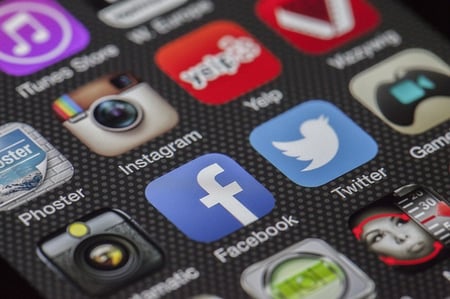
Arts & Entertainment
These are topics that are currently affecting sports, tv, Hollywood, literature, music, and art.
Should movies and television shows be forced to hire more diverse casts?
Hollywood has come under fire for “whitewashing” or the act of casting a white actor when the role should have gone to a person of color. An example of this is when Rupert Sanders, director of Ghost in the Shell , cast Scarlett Johansson as the Asian protagonist Major . Opponents of this practice argue that “whitewashing” takes jobs away from deserving POC actors. However, others argue that art should be free of any restrictions or boundaries .
Should the show 13 Reasons Why have removed its controversial scenes?
In 2017, Netflix released an original show based on the young adult novel 13 Reasons Why , which focuses on the suicide of 17-year-old Hannah Baker. Parents and educators opposed the release of this show due to the fact that it involved several controversial topics for teens such as suicide and rape. But those that support the show have argued that it provided a way to start conversations with teens about these tough topics . Ultimately, Netflix went back and edited out the controversial scenes. This topic gives you the opportunity to talk about whether mature content like suicide and rape is appropriate in shows aimed toward teenagers. You can also discuss whether Netflix’s removal of the offending scenes is the right decision or not.
Should male and female actors make the same amount of money?
In 2018, Hollywood came under fire after the internet learned that Michelle Williams was paid substantially less for her role in “All The Money In The World” than her male co-star, Mark Wahlberg. Some argue that as the bigger star, Whalberg deserved to be compensated at a higher rat e. Others argue that Williams did the same amount of work as Wahlberg and should receive the same amount of pay. This issue plugs into the larger social issue of pay discrepancies based on race and gender.
Should athletes be allowed to kneel during the national anthem?
People have started to boycott Nike for their commercial featuring Colin Kaepernick . Kaepernick is a San Francisco 49ers quarterback who has received a lot of press for being the first athlete to kneel during the national anthem in protest the treatment of African Americans and minorities in the United States. President Trump has publicly stated that any athlete who kneels during the national anthem is being disrespectful and should be fired. Yet others defend kneeling during the anthem, regarding it as an expression of free speech that’s protected under the First Amendment.
The 5 Best Tips for Treating Controversial Topics With Sensitivity and Respect
In order to write a good argument and convince your reader/listener to agree with you, you will need to treat your controversial issue with sensitivity and respect. This helps the reader/listener to trust you.
But that can be really hard when you feel passionately about your topic and your opinions! Here are the best tips for making sure you stick to the facts, not the feelings.
Tip #1: Avoid Charged Language
An author is accused of using loaded language when they substitute words with positive or negative connotations instead of using more neutral language. Some examples of this are using the word “superior” instead of better, calling the opposition “stupid,” or using biased terminology (“infanticide” vs. “abortion”). While emotional appeals are a great tool to persuade people to your point of view, when they’re used in the wrong way, they come across as overly aggressive and biased.
Tip #2 : Avoid Logical Fallacies
A logical fallacy is an error in your argument’s logic because it presents the topic’s information in a deceptive way. Below are some common logical fallacies to watch out for.
Straw Man Fallacy: this is when you ignore your opponent’s real argument and instead argue that your opponent believes something easily ridiculed or proved false.
Slippery Slope: this is when you argue that something seemingly benign will lead to an unlikely extreme.
Generalizations: generalizations are statements about an idea that do not have any facts to support them. They tend to play into stereotypes and often rely on exaggerations or over the top statements.
For more information on logical fallacies and how to avoid them, check out this resource.

Tip #3: Do Not Attack Your Opponent Personally
This is called an ad hominem fallacy, and is often referred to as “mud-slinging” or “bashing.” When you do this, it implies that the only way you can counter your opponents viewpoints is through personal attacks. (Also, it’s just not cool.) Instead, stick to using facts and figures to show why their argument is wrong.
Tip #4: Avoid Hyperbole, Stereotypes, and Clichés
These are common issues that crop up in argumentative writing that ultimately weaken your position.
Hyperbole happens when you exaggerate. When you use hyperbole, you risk misrepresenting the issue at hand—which is an argument killer. For example, take this statement: “If we don’t stop climate change now, we’ll all be dead in 10 years.” While climate change is definitely a huge risk to humanity, saying everyone on Earth will die in a decade if we don’t fix is a significant exaggeration. It would be better to say something like, “If we don’t start to solve climate change now, we’re risking the livelihoods and safety of future generations.” This is a more moderate statement that you can back up with facts, like scientists’ belief that climate change will put coastal cities underwater.
Stereotypes are oversimplified, misinformed, or prejudiced assumptions held about other people or things. For example, a common stereotype is that all women love pink. (Spoiler alert: they don’t.) While stereotypes like this seem harmless, most are not. For example, a stereotype like the idea that all immigrants are criminals is extremely harmful. Stereotypes are not only false, they make you seem biased and ill-informed.
Finally, clichés are overused or commonplace phrases, themes, or expressions . These are often phrases that have been said so much that they’ve lost all real meaning. For example, the idea that people can “pull themselves up by their bootstraps” is a textbook example of a cliché. Instead, it’s better to explain the idea behind the cliché in more detail. In this case, it would be better to say that people—no matter their station in life—can create opportunities for themselves through hard work.
Tip #5 : Don’t Beat a Dead Horse
Remember that your job is to present them with the facts in an open and honest way. If you have done a good job, your reader or listener will come away with the same opinion as you, or at least more informed. It’s okay to state your opinion in your paper as long as you use other sources to back your opinion up and are fair to the other side. (Also resist the urge to restate your opinion every other sentence—it’s monotonous and doesn’t do much to win your reader over!)

5 Resources for Finding More Controversial Debate Topics
If you’re not inspired by the topics we’ve already mentioned, don’t worry. There are many other controversial topics out there! Here are some other places you can look to find a topic that’s perfect for your essay or debate.
#1: ProCon.Org
You probably noticed that we’ve included links in this article that take you to ProCon.org . That’s because this website is a treasure trove of controversial issues! The website has lists of ideas that they break down into general pro/con lists, and each topic links you research starters.
#2: National & Local News
Much of the modern news cycle is devoted to discussing hot-button topics of our time. If you’re looking for topics related to current events, news sources like The New York Times and The Washington Post will help! Also, don’t discount your local news resources, either. They’ll give you valuable information about what’s going on in your community and how larger, national issues are impacting where you live.
#3: They Say / I Say: The Moves That Matter in Academic Writing (Fourth Edition) by Cathy Birkenstein & Gerald Graff
Writing argumentative papers where you have to pick (and defend) your perspective is a skill you’ll use throughout high school, college, and beyond. They Say/I Say walks you through everything you need to know to write an argument. Even better: the book uses controversial issues as a way to teach writing, so you’ll get expert instruction on how to use them to write an amazing paper.
#4: Documentaries
Documentaries provide more in-depth perspectives on topics—both historical and contemporary—that have shaped the world. A great documentary can give you a thorough overview of an issue, and often they dig into different perspectives around an event, idea, or historical moment. The PBS series, Frontline , is a good place to start, but don’t be afraid to look at critically acclaimed films (like The Times of Harvey Milk or How to Survive a Plague ) for inspiration as well.
#5: The Learning Network
The Learning Network , a blog run by The New York Times, is a great resource for students and teachers. They have lots of great resources, and their article on 200 prompts for argumentative writing is amazing for anyone looking for essay or debate topics. The article split into categories by topic and links to articles that can help explain each issue. It’s a great place to find a topic that interests you.
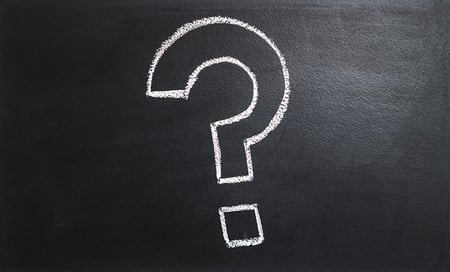
What’s Next?
Controversial topics are just the tip of the iceberg when it comes to things you can research and write about for class. Check out our list of 113 amazing research paper topics to put you on the path to an A+ paper grade! ( If you’re looking for speech topics or argumentative essay topics , we’ve got you covered, too.)
Researching a controversial topic is just the first step in the argumentative process. You also have to be able to persuade your reader or listener to believe in your point of view. Here are 3 killer tips to help you write an amazing argumentative essay.
Learning how to read critically, come up with an argument, and communicate it is one of the fundamental skills you’ll need to tackle the writing portions of the SAT and ACT. To make sure you’re prepared, check out our step-by-step guide to the essay portion of the SAT ( and the ACT ).
These recommendations are based solely on our knowledge and experience. If you purchase an item through one of our links, PrepScholar may receive a commission.

Ashley Sufflé Robinson has a Ph.D. in 19th Century English Literature. As a content writer for PrepScholar, Ashley is passionate about giving college-bound students the in-depth information they need to get into the school of their dreams.
Student and Parent Forum
Our new student and parent forum, at ExpertHub.PrepScholar.com , allow you to interact with your peers and the PrepScholar staff. See how other students and parents are navigating high school, college, and the college admissions process. Ask questions; get answers.

Ask a Question Below
Have any questions about this article or other topics? Ask below and we'll reply!
Improve With Our Famous Guides
- For All Students
The 5 Strategies You Must Be Using to Improve 160+ SAT Points
How to Get a Perfect 1600, by a Perfect Scorer
Series: How to Get 800 on Each SAT Section:
Score 800 on SAT Math
Score 800 on SAT Reading
Score 800 on SAT Writing
Series: How to Get to 600 on Each SAT Section:
Score 600 on SAT Math
Score 600 on SAT Reading
Score 600 on SAT Writing
Free Complete Official SAT Practice Tests
What SAT Target Score Should You Be Aiming For?
15 Strategies to Improve Your SAT Essay
The 5 Strategies You Must Be Using to Improve 4+ ACT Points
How to Get a Perfect 36 ACT, by a Perfect Scorer
Series: How to Get 36 on Each ACT Section:
36 on ACT English
36 on ACT Math
36 on ACT Reading
36 on ACT Science
Series: How to Get to 24 on Each ACT Section:
24 on ACT English
24 on ACT Math
24 on ACT Reading
24 on ACT Science
What ACT target score should you be aiming for?
ACT Vocabulary You Must Know
ACT Writing: 15 Tips to Raise Your Essay Score
How to Get Into Harvard and the Ivy League
How to Get a Perfect 4.0 GPA
How to Write an Amazing College Essay
What Exactly Are Colleges Looking For?
Is the ACT easier than the SAT? A Comprehensive Guide
Should you retake your SAT or ACT?
When should you take the SAT or ACT?
Stay Informed
Get the latest articles and test prep tips!
Looking for Graduate School Test Prep?
Check out our top-rated graduate blogs here:
GRE Online Prep Blog
GMAT Online Prep Blog
TOEFL Online Prep Blog
Holly R. "I am absolutely overjoyed and cannot thank you enough for helping me!”
Controversial Reddit communities
Related topics, broader ( 1 ), papers overview.
- J. LaViolette , B. Hogan
- International Conference on Web and Social Media
- Corpus ID: 189818861

- Alissa Centivany
- ASIS&T Annual Meeting
- Corpus ID: 33562264
- P. Hassan , Pg Nor Zamzam
- Corpus ID: 115102895

Georgia governor signs controversial bill restricting children's access to the internet

A controversial bill that would impose new restrictions on minors’ internet use was signed into law by Georgia Gov. Brian Kemp on Tuesday, unleashing concerns about ensuring children’s safety online while protecting students’ right to freedom of expression.
Introduced by state Sen. Jason Anavitarte (R-Dallas), the bill mirrors legislation passed in states like Louisiana, Arkansas, Texas and Utah that would require parental consent before allowing minors to create social media accounts. It also echoes a Texas law that would mandate age verification on pornography sites by requiring users to upload a government-issued photo ID before allowing them to view adult content. Any sites that do not enforce these rules would receive a $10,000 fine for each child who accesses content deemed “harmful to minors.”
Proponents of the bill say that it will protect children’s mental health by reducing access to social media platforms and imposing greater restrictions on the kinds of content minors can view.
Georgia was among a coalition of 33 states that filed a lawsuit against Meta, the parent company of Facebook and Instagram, for creating features it claims were deliberately designed to be addictive to children.
More: Donald Trump trial live updates: David Pecker on National Enquirer killing stories
Prep for the polls: See who is running for president and compare where they stand on key issues in our Voter Guide
“As social media has taken on more and more room in our young people’s lives, we have seen increases in mental health struggles and other negative behaviors and attitudes,” Kemp said at the bill signing ceremony in Atlanta. “We cannot continue to sit by and do nothing as young Georgians develop addictions and disorders, and suffer at the hands of online antagonists. I’m proud to sign this bill and put Georgians — children — first above all else.”
However, opponents have raised concerns about the bill’s efficacy, arguing that the state Legislature is violating students’ First Amendment rights and raising privacy concerns for all Georgia residents. Bans on social media usage in schools will extend to all electronics connected to school Wi-Fi networks, preventing teachers from incorporating tools like educational YouTube videos into their lessons.
More: Eighteen states and D.C. file amicus brief opposing Raffensperger voting rights appeal
Mandating that websites collect and store personal information also raises a slew of safety and privacy concerns, particularly in the event of a hack or data breach. The law could also effectively restrict access to adult content for Georgia residents regardless of age. Online pornography website Pornhub currently restricts access from users in seven states (Arkansas, Louisiana, Mississippi, Montana, North Carolina, Texas, Utah and Virginia) due to age verification laws.
A federal judge has already blocked the Arkansas law, citing concerns over its effectiveness and constitutionality. Whether the bill will be challenged or overturned in Georgia remains to be seen, but Kemp stated that he was not worried about the bill’s chances in court.
“If we were concerned about all the legal challenges that we may get this session, we probably wouldn’t have passed anything,” Kemp said. “I’m not too worried about that. I think most people want us taking common-sense actions to protect our children, especially from bad actors, when it comes to access to social media and what they’re getting off of their phones or computers now, and I think parents in the state want us to do that as well.”
The ACLU of Georgia and Georgia First Amendment Foundation have condemned the legislation, and NetChoice, a trade association promoting free enterprise and online expression, condemned its passage.
“[This bill] breaches Georgians’ privacy, endangers security, violates constitutional rights, and creates a one-size-fits-all ‘solution’ that erases parents,” NetChoice Vice President Carl Szabo said in a statement. “It’s unfortunate to see Georgia implement a similar, failed idea as some other states nationwide.
States like Ohio have already unsuccessfully tried to enact similar approaches, and various courts have echoed concerns when halting these laws. There are better ways to protect Georgians, their families and their data online without infringing on their freedoms or jeopardizing their safety and security.”
The law is scheduled to go into effect on July 1, 2025.
Numbers, Facts and Trends Shaping Your World
Read our research on:
Full Topic List
Regions & Countries
- Publications
- Our Methods
- Short Reads
- Tools & Resources
Read Our Research On:
Partisan divides over K-12 education in 8 charts
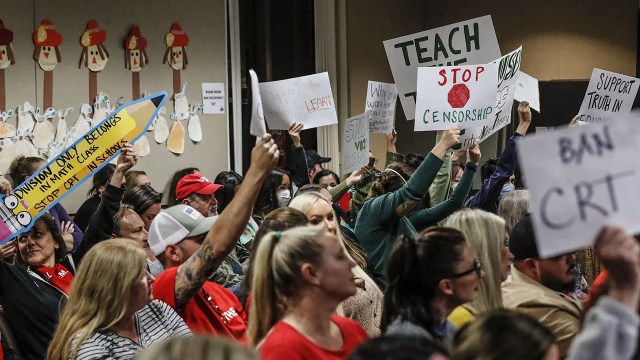
K-12 education is shaping up to be a key issue in the 2024 election cycle. Several prominent Republican leaders, including GOP presidential candidates, have sought to limit discussion of gender identity and race in schools , while the Biden administration has called for expanded protections for transgender students . The coronavirus pandemic also brought out partisan divides on many issues related to K-12 schools .
Today, the public is sharply divided along partisan lines on topics ranging from what should be taught in schools to how much influence parents should have over the curriculum. Here are eight charts that highlight partisan differences over K-12 education, based on recent surveys by Pew Research Center and external data.
Pew Research Center conducted this analysis to provide a snapshot of partisan divides in K-12 education in the run-up to the 2024 election. The analysis is based on data from various Center surveys and analyses conducted from 2021 to 2023, as well as survey data from Education Next, a research journal about education policy. Links to the methodology and questions for each survey or analysis can be found in the text of this analysis.
Most Democrats say K-12 schools are having a positive effect on the country , but a majority of Republicans say schools are having a negative effect, according to a Pew Research Center survey from October 2022. About seven-in-ten Democrats and Democratic-leaning independents (72%) said K-12 public schools were having a positive effect on the way things were going in the United States. About six-in-ten Republicans and GOP leaners (61%) said K-12 schools were having a negative effect.
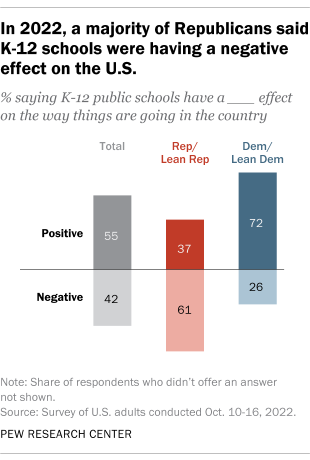
About six-in-ten Democrats (62%) have a favorable opinion of the U.S. Department of Education , while a similar share of Republicans (65%) see it negatively, according to a March 2023 survey by the Center. Democrats and Republicans were more divided over the Department of Education than most of the other 15 federal departments and agencies the Center asked about.
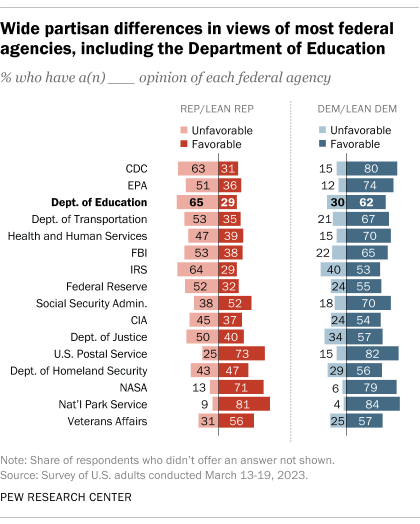
In May 2023, after the survey was conducted, Republican lawmakers scrutinized the Department of Education’s priorities during a House Committee on Education and the Workforce hearing. The lawmakers pressed U.S. Secretary of Education Miguel Cardona on topics including transgender students’ participation in sports and how race-related concepts are taught in schools, while Democratic lawmakers focused on school shootings.
Partisan opinions of K-12 principals have become more divided. In a December 2021 Center survey, about three-quarters of Democrats (76%) expressed a great deal or fair amount of confidence in K-12 principals to act in the best interests of the public. A much smaller share of Republicans (52%) said the same. And nearly half of Republicans (47%) had not too much or no confidence at all in principals, compared with about a quarter of Democrats (24%).
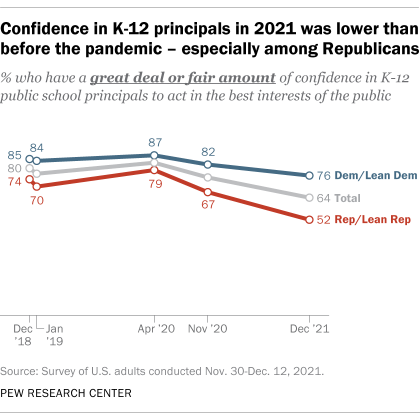
This divide grew between April 2020 and December 2021. While confidence in K-12 principals declined significantly among people in both parties during that span, it fell by 27 percentage points among Republicans, compared with an 11-point decline among Democrats.
Democrats are much more likely than Republicans to say teachers’ unions are having a positive effect on schools. In a May 2022 survey by Education Next , 60% of Democrats said this, compared with 22% of Republicans. Meanwhile, 53% of Republicans and 17% of Democrats said that teachers’ unions were having a negative effect on schools. (In this survey, too, Democrats and Republicans include independents who lean toward each party.)
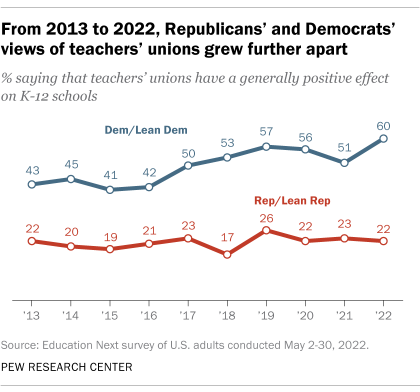
The 38-point difference between Democrats and Republicans on this question was the widest since Education Next first asked it in 2013. However, the gap has exceeded 30 points in four of the last five years for which data is available.
Republican and Democratic parents differ over how much influence they think governments, school boards and others should have on what K-12 schools teach. About half of Republican parents of K-12 students (52%) said in a fall 2022 Center survey that the federal government has too much influence on what their local public schools are teaching, compared with two-in-ten Democratic parents. Republican K-12 parents were also significantly more likely than their Democratic counterparts to say their state government (41% vs. 28%) and their local school board (30% vs. 17%) have too much influence.
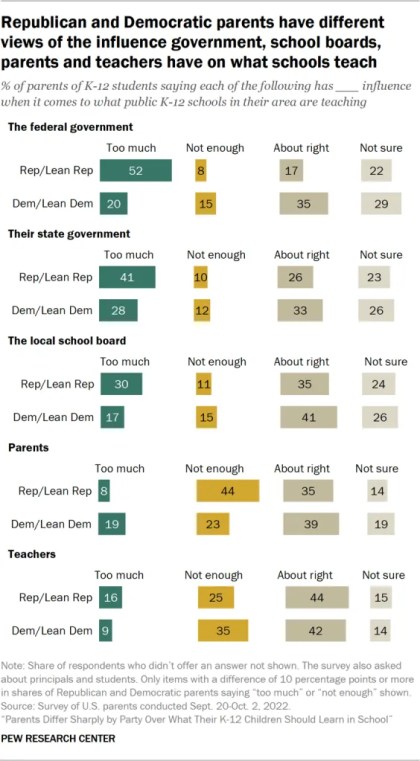
On the other hand, more than four-in-ten Republican parents (44%) said parents themselves don’t have enough influence on what their local K-12 schools teach, compared with roughly a quarter of Democratic parents (23%). A larger share of Democratic parents – about a third (35%) – said teachers don’t have enough influence on what their local schools teach, compared with a quarter of Republican parents who held this view.
Republican and Democratic parents don’t agree on what their children should learn in school about certain topics. Take slavery, for example: While about nine-in-ten parents of K-12 students overall agreed in the fall 2022 survey that their children should learn about it in school, they differed by party over the specifics. About two-thirds of Republican K-12 parents said they would prefer that their children learn that slavery is part of American history but does not affect the position of Black people in American society today. On the other hand, 70% of Democratic parents said they would prefer for their children to learn that the legacy of slavery still affects the position of Black people in American society today.
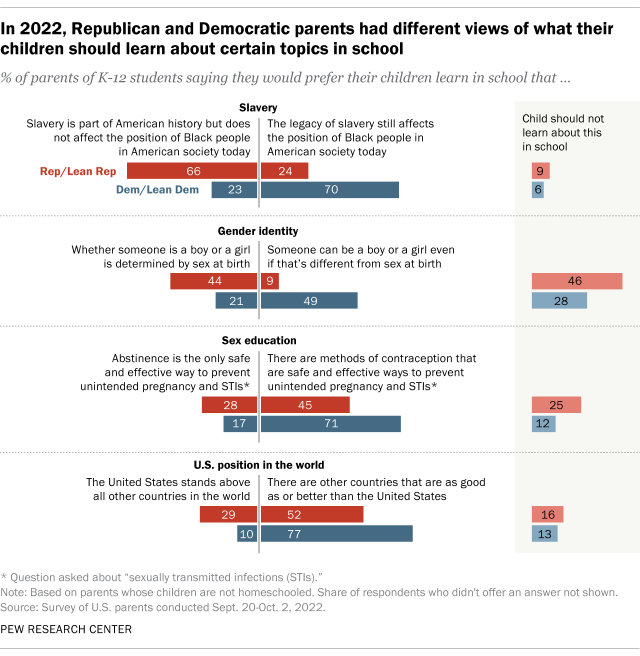
Parents are also divided along partisan lines on the topics of gender identity, sex education and America’s position relative to other countries. Notably, 46% of Republican K-12 parents said their children should not learn about gender identity at all in school, compared with 28% of Democratic parents. Those shares were much larger than the shares of Republican and Democratic parents who said that their children should not learn about the other two topics in school.
Many Republican parents see a place for religion in public schools , whereas a majority of Democratic parents do not. About six-in-ten Republican parents of K-12 students (59%) said in the same survey that public school teachers should be allowed to lead students in Christian prayers, including 29% who said this should be the case even if prayers from other religions are not offered. In contrast, 63% of Democratic parents said that public school teachers should not be allowed to lead students in any type of prayers.
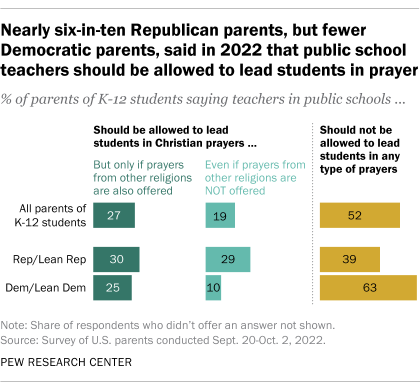
In June 2022, before the Center conducted the survey, the Supreme Court ruled in favor of a football coach at a public high school who had prayed with players at midfield after games. More recently, Texas lawmakers introduced several bills in the 2023 legislative session that would expand the role of religion in K-12 public schools in the state. Those proposals included a bill that would require the Ten Commandments to be displayed in every classroom, a bill that would allow schools to replace guidance counselors with chaplains, and a bill that would allow districts to mandate time during the school day for staff and students to pray and study religious materials.
Mentions of diversity, social-emotional learning and related topics in school mission statements are more common in Democratic areas than in Republican areas. K-12 mission statements from public schools in areas where the majority of residents voted Democratic in the 2020 general election are at least twice as likely as those in Republican-voting areas to include the words “diversity,” “equity” or “inclusion,” according to an April 2023 Pew Research Center analysis .
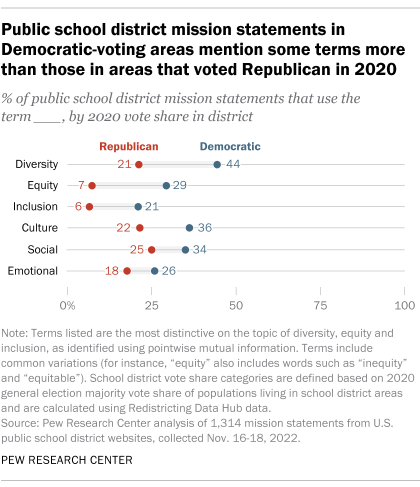
Also, about a third of mission statements in Democratic-voting areas (34%) use the word “social,” compared with a quarter of those in Republican-voting areas, and a similar gap exists for the word “emotional.” Like diversity, equity and inclusion, social-emotional learning is a contentious issue between Democrats and Republicans, even though most K-12 parents think it’s important for their children’s schools to teach these skills . Supporters argue that social-emotional learning helps address mental health needs and student well-being, but some critics consider it emotional manipulation and want it banned.
In contrast, there are broad similarities in school mission statements outside of these hot-button topics. Similar shares of mission statements in Democratic and Republican areas mention students’ future readiness, parent and community involvement, and providing a safe and healthy educational environment for students.
- Education & Politics
- Partisanship & Issues
- Politics & Policy
Jenn Hatfield is a writer/editor at Pew Research Center
Most Americans think U.S. K-12 STEM education isn’t above average, but test results paint a mixed picture
About 1 in 4 u.s. teachers say their school went into a gun-related lockdown in the last school year, about half of americans say public k-12 education is going in the wrong direction, what public k-12 teachers want americans to know about teaching, what’s it like to be a teacher in america today, most popular.
1615 L St. NW, Suite 800 Washington, DC 20036 USA (+1) 202-419-4300 | Main (+1) 202-857-8562 | Fax (+1) 202-419-4372 | Media Inquiries
Research Topics
- Age & Generations
- Coronavirus (COVID-19)
- Economy & Work
- Family & Relationships
- Gender & LGBTQ
- Immigration & Migration
- International Affairs
- Internet & Technology
- Methodological Research
- News Habits & Media
- Non-U.S. Governments
- Other Topics
- Race & Ethnicity
- Email Newsletters
ABOUT PEW RESEARCH CENTER Pew Research Center is a nonpartisan fact tank that informs the public about the issues, attitudes and trends shaping the world. It conducts public opinion polling, demographic research, media content analysis and other empirical social science research. Pew Research Center does not take policy positions. It is a subsidiary of The Pew Charitable Trusts .
Copyright 2024 Pew Research Center
Terms & Conditions
Privacy Policy
Cookie Settings
Reprints, Permissions & Use Policy

COMMENTS
In other words, that the damage and trauma is also a product of someones sexual upbringing and education. To the people about to lose their shit: Rape is horrible, rape is fucking vile and disgusting. This question is not about rape. And it would be a very controversial topic for a research paper. Reply reply.
Welcome to r/science!This is a heavily moderated subreddit in order to keep the discussion on science. However, we recognize that many people want to discuss how they feel the research relates to their own personal lives, so to give people a space to do that, personal anecdotes are allowed as responses to this comment.Any anecdotal comments elsewhere in the discussion will be removed and our ...
We've come up with a few dozen debate topics for college students and high schoolers. You'll notice our lists include a mix of argumentative, persuasive, and controversial debate topics. As always, you can mix and match any of the ideas you find peculiar and use them to tickle your imagination and develop issues we haven't covered in this ...
Welcome to r/science!This is a heavily moderated subreddit in order to keep the discussion on science. However, we recognize that many people want to discuss how they feel the research relates to their own personal lives, so to give people a space to do that, personal anecdotes are allowed as responses to this comment.Any anecdotal comments elsewhere in the discussion will be removed and our ...
Controversial Research Topics. Controversial Research Topics are as follows: The impact of genetically modified organisms on human health. The use of embryonic stem cells for medical research. The effectiveness of abstinence-only sex education. The effects of violent video games on children and adolescents. The link between intelligence and race.
44M subscribers in the AskReddit community. r/AskReddit is the place to ask and answer thought-provoking questions.
This article offers a systematic analysis of 727 manuscripts that used Reddit as a data source, published between 2010 and 2020. Our analysis reveals the increasing growth in use of Reddit as a data source, the range of disciplines this research is occurring in, how researchers are getting access to Reddit data, the characteristics of the datasets researchers are using, the subreddits and ...
Common Controversial Research Paper Topics. The Ethics of Genetic Editing: Balancing Innovation and Morality. Climate Change: Addressing Skepticism and Urgency for Affirmative Action. The Legality and Ethics of Euthanasia in Modern Society. Concealed Handguns: Balancing Second Amendment and Civil Rights.
4. Animal testing. Animal testing is one of the most controversial areas of scientific research on this list. Many people couldn't care less, while others vehemently oppose it. For years, animal ...
At a Glance. Some of the most controversial and unethical experiments in psychology include Harlow's monkey experiments, Milgram's obedience experiments, Zimbardo's prison experiment, Watson's Little Albert experiment, and Seligman's learned helplessness experiment. These and other controversial experiments led to the formation of rules and ...
A study by the Pew Research Center (2013) concluded that 6% of online adults are Reddit users , and by the time of writing, Alexa Footnote 1 ranks it as #6 in the United States and #15 globally Footnote 2.Reddit uses up- and down-votes to identify controversial content; with these votes representing agreement or disagreement, respectively, if ...
Please followed the sidebar rules. r/therapists is a place for therapists and mental health professionals to discuss their profession among each other.. If you ARE NOT A THERAPIST and are asking for advice this not the place for you.Your post will be removed in short order. Please try one of the reddit communities such as r/TalkTherapy, r/askatherapist, r/SuicideWatch that are set up for this.
See our ~~*Best Of*~~ "Most Controversial" at /r/AITAFiltered! ... I actually did research this very topic recently, because my idiot ex threatened to sue me for my last name. You see, he married a woman who has the same name as I do, albeit spelled slightly differently (think Rachel versus Rachael). ... I do a lot of research utilizing reddit.
More Topics Animals and Pets Anime Art Cars and Motor Vehicles Crafts and DIY Culture, Race, and Ethnicity Ethics and Philosophy Fashion Food and Drink History Hobbies Law Learning and Education Military Movies Music Place Podcasts and Streamers Politics Programming Reading, Writing, and Literature Religion and Spirituality Science Tabletop ...
Whether you are a current student, staff member, alumnus, or simply interested in the university, this subreddit is for you. This community serves as a platform for discussion on a variety of topics, from academic discussions, campus life experiences, and event updates to news and research insights.
Update 3: First, im sorry if I couldn't respond to everyone. I didnt expect this post to end up with 8.6 million views. It makes me sad that this topic struck a cord with so many people. Sorry to the ones that have gone through this or something similar. I've received some requests for updates. Here is where I am at.
ProCon.org has over 100 topics complete with pro and con arguments, quotes and statistics from experts, historical information, and other pertinent research. Abortion - Should abortion be legal? Alternative Energy - Can alternative energy effectively replace fossil fuels? American Socialism - Should the U.S. become socialist?
Welcome to the website of the Journal of Controversial Ideas, the first open access, peer-reviewed, interdisciplinary journal specifically created to promote free inquiry on controversial topics.. The Journal of Controversial Ideas offers a forum for careful, rigorous, unpolemical discussion of issues that are widely considered controversial, in the sense that certain views about them might be ...
Tip #4: Avoid Hyperbole, Stereotypes, and Clichés. These are common issues that crop up in argumentative writing that ultimately weaken your position. Hyperbole happens when you exaggerate. When you use hyperbole, you risk misrepresenting the issue at hand—which is an argument killer.
The social news site Reddit has occasionally been the topic of controversy due to the presence of communities on the site (known as subreddits) devoted to explicit material. Yishan Wong, the site's former CEO, has stated that "We stand for free speech. This means we are not going to ban distasteful subreddits. We will not ban legal content even if we find it odious or if we personally condemn it."
A controversial bill that would impose new restrictions on minors' internet use was signed into law by Georgia Gov. Brian Kemp on Tuesday, unleashing concerns about ensuring children's safety ...
Workers in a SAG-AFTRA picket line at Sony Pictures Studios in Culver City, California, on Oct. 11, 2023. (Apu Gomes/Getty Images) The nearly four-month actors' strike against major Hollywood production studios in 2023 was the second-largest labor dispute in the United States in at least three decades, according to a Pew Research Center analysis of federal data through Nov. 30.
Most Democrats say K-12 schools are having a positive effect on the country, but a majority of Republicans say schools are having a negative effect, according to a Pew Research Center survey from October 2022. About seven-in-ten Democrats and Democratic-leaning independents (72%) said K-12 public schools were having a positive effect on the way things were going in the United States.